

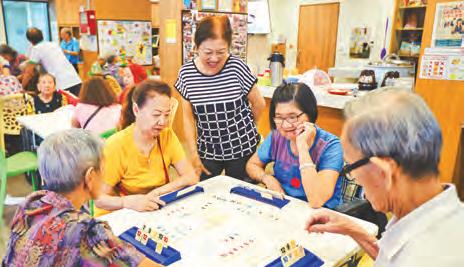






















COVER STORY
From ‘What’s the Matter’ to ‘What Matters’: How Personalised Care and Support Planning Puts You First
As healthcare shifts towards people playing an active role in their own health, Yishun Health’s Personalised Care and Support Planning framework is in place to enable that WITH
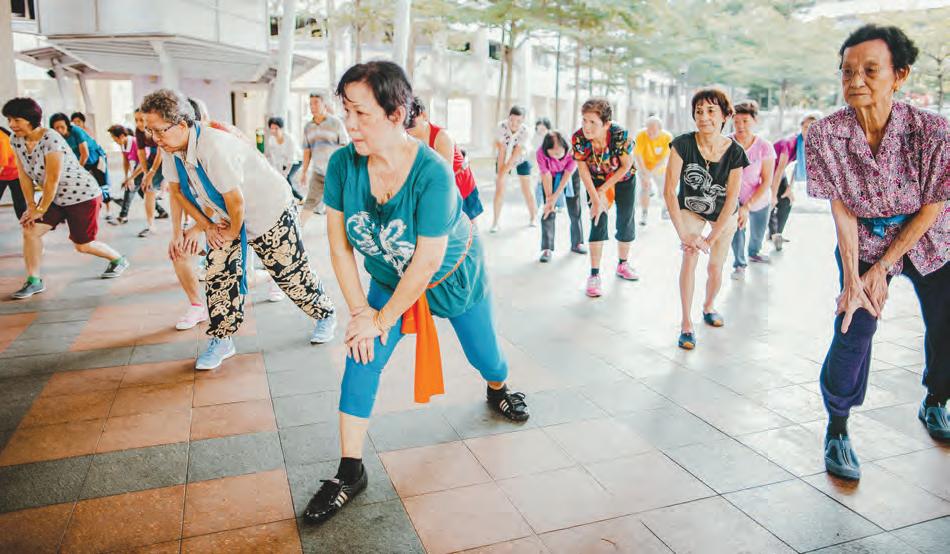
4 WHAT’S UP Community events, outreach efforts, and more

YH IN THE NEWS A roundup of Yishun Health appearances in the media
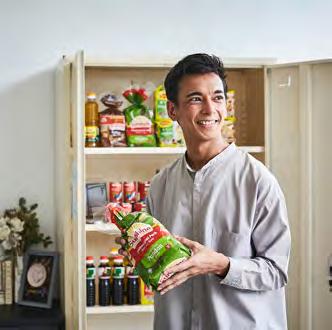
5 THINGS ABOUT… Peritoneal Dialysis Essential facts about this vital procedure for kidney failure patients
Part 1 of 3
As Yishun Health strives to build our Ecosystems of Care — our framework for growing our participatory care and community services ecosystem — we are adopting several approaches that not only bring care into communities, but also enable people to participate in their own health. In the first of our three-part series, we explore how Yishun Health is using the Personalised Care and Support Planning (PCSP) approach to elevate people’s voices and enhance their experiences as people first then patient next by putting their goals and needs first.
Yishun Health is a network of medical institutions and health facilities in the north of Singapore, under the National Healthcare Group. It comprises Admiralty Medical Centre, Khoo Teck Puat Hospital and Yishun Community Hospital. It also includes community extensions such as Wellness Kampung.
Scan here to subscribe to aha online for regular updates and stories from Yishun Health!

The name aha holds much significance for us at Yishun Health. In part, it is a nod to our history; it also stands for ‘Advocates for Health in Action’. Through these pages, we hope to empower you to take charge of your own health and discover those ‘aha!’ moments that lead to a healthier, happier you.
COMMITTEE The editorial committee — made up of clinical, nursing, allied health, population health & community transformation, and administrative heads of department — advises aha’s direction. A/Prof Tan Kok Yang Bastari Irwan Caroline Tan Fatimah Moideen Kutty Shirley Heng Teresa Foong
Hannah Wong Jack Lau Sabrina Ng Sharon Ng Albert Foo www.ktph.com.sg/ about-us/media/publications aha@ktph.com.sg

THINKFARM PTE LTD www.thinkfarm.sg
MANAGING DIRECTOR Christopher Tay

Kim Beng
aha is the official bi-monthly publication of Khoo Teck Puat Hospital (Co. Reg. No. 200717564H) and is produced by ThinkFarm Pte Ltd. All rights to this publication are reserved and no part may be reproduced without the expressed written consent of the publishers. While every effort has been made to ensure that the information in this newsletter is accurate and up to date, the editorial team will not be responsible for errors due to information received. Opinions expressed are that of the writers and do not necessarily represent the views and opinions of the publishers. Printed by Mainland Press Pte Ltd. MCI (P) 062/07/2022
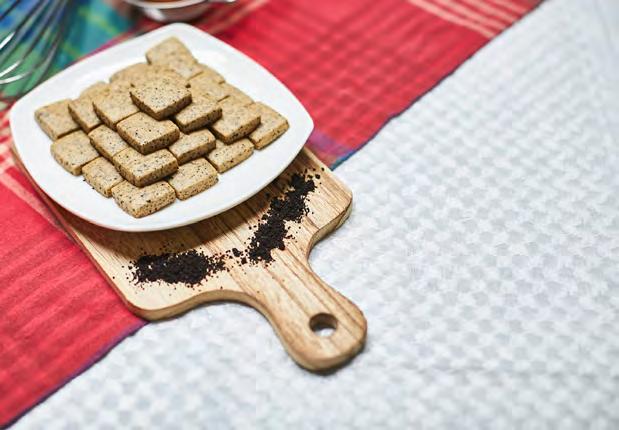
Yishun Community Hospital’s (YCH) efforts in delivering high-quality intermediate care were recognised at the 2022 Community Care Excellence Awards. Held in conjunction with the Community Care SPRINT Forum on 18 October 2022, the awards acknowledge the contributions of individuals and project teams who have demonstrated exemplary service and commitment in the Community Care sector.
Dr Brillantes Salvador Solano, Resident Physician, Medical Services, and Julia Lau, Senior Staff Nurse, Ward D48, received individual gold awards for their dedication to elevating the patient experience as well as contributions to improving clinical care.
For team projects, two YCH teams also swept gold. One team received the Client Experience Improvement Award for redesigning rehabilitation roles in a COVID-19 treatment facility during the pandemic. This allowed the hospital to efficiently and effectively care for COVID-19 patients who had less severe
infections, and those who required close observation but did not need hospitalisation. The other team won the gold Productivity Improvement Award for their project, Beyond the Walls — Promoting Safe Transitions Home, which ensures the continuity of care for the patients beyond our hospital.
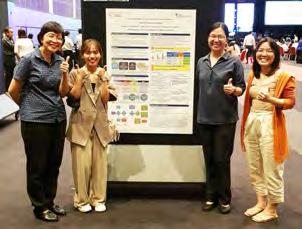
This year’s NHG Quality Day, themed ‘Keeping You in the Centre of Transformation’, was held on 15 September 2022 to recognise individuals and teams for their commitment to quality improvement and care delivery. In all, two allied health professionals and six teams from Yishun Health won awards for achieving better and safer care.
The Quality Improvement Award was given to these teams for bolstering NHG’s sustainable healthcare model.
• For improving the rate of inpatient influenza vaccinations, a Geriatric
Medicine team won under the Service Redesign & Delivery category
• The DaVinci team project won the Building Strong Partnerships in Improvement Work award for reducing the frequency of emergency room visits and admissions for
haemodialysis patients
• A team from Ward A71 were lauded under the Developing a Flexible and Sustainable Workforce category for a project on managing and caring for patients at risk of suicide

Four Excellence in Action Awards were given to:
• Hazel Yeong, Senior Dietitian, Nutrition & Dietetics
• Cher Siong Kie, Senior Physiotherapist, Rehabilitation Services
• Ward A52’s Patient Care Unit team
• Geriatric Surgery Service team
• Ageing-in-Place Medical Home team
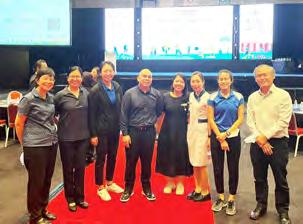
On 1 November 2022, Yishun Health received the Labour Movement U Safe Champion Award. This Award is conferred by NTUC, and recognises unions, unionised companies, or business partners who have been proactive in championing progressive workplace practices and creating safer and healthier workplaces.
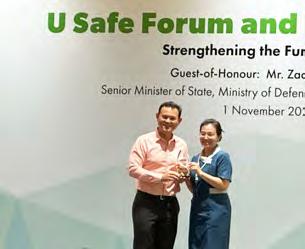
This recognition validates Yishun
Health’s ethos of a safe and healthy environment that is built on a culture of acceptance, respect and empathy. Some of the strategies to achieve this have been Peers Around Lending Support and Speaking Up for Safety, initiatives that promote and support staff in psychological and physical safety.
In 2021, Yishun Health also implemented the Joy-In-Work
Framework to better align initiatives and optimise resources to provide support at the organisational, departmental and individual levels. A long-running Safety Committee, comprising 30 experts from various professional groups and domains, also develops annual work plans that focus on strategic areas to reinforce good processes, practices and standards.
Safety is a way of life for Yishun Health, and this culture has received recognition from several external organisations this year.
On 27 September 2022, KTPH and YCH received the Fire Safety Excellence Award from the National Fire and Emergency Preparedness Council, with whom Yishun Health collaborated during a Mass Fire Evacuation Drill held earlier the same month.
Yishun Health was also one of 137 award recipients that achieved the Outstanding Individual Award at the National Safety and Security Watch Group Award Ceremony 2022.

This award recognises members at the national level for their collaboration with the Singapore Police Force (SPF) and Singapore Civil Defence Force to enhance security levels.
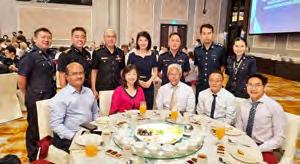
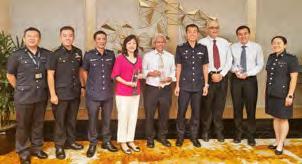
In addition to these honours, Yishun Health and other community partners and stakeholders
were presented with a token of appreciation at the Woodlands Police Division’s annual Community Partnership Forum on 9 September 2022. This year’s session highlighted the key crime prevention initiatives as a result of SPF’s close collaboration with the community.
To keep Yishun Health on its toes and maintain high standards of fire and emergency response, the organisation holds regular fire drills. To this end, Yishun Health conducted its annual Mass Fire Evacuation Drill (MFED) at KTPH Ward B106 on 1 September 2022.
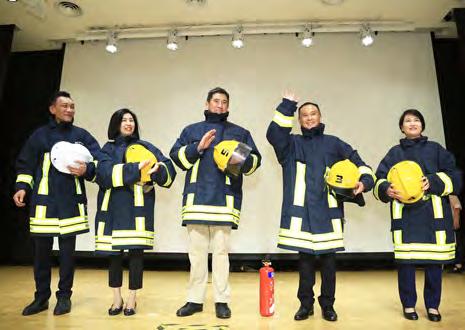
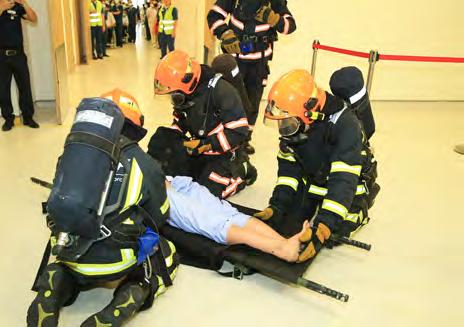
When smoke began to billow and the alarms sounded, staff moved with speed and professionalism to initiate fire safety protocols. They transferred patients safely and quickly, attended to the injured, and ensured a calm and organised evacuation to the safe zone.
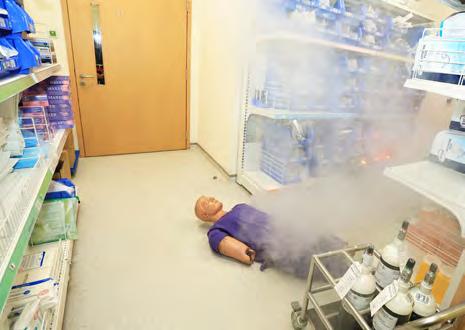
Following the action-packed afternoon, a MFED Opening Ceremony was held at the KTPH auditorium. This ceremony saw CEO Prof Chua Hong Choon, COO Yen Tan and Chief Nurse Ms Shirley Heng, as well as National Fire and Emergency Preparedness Council (NFEC) Chairman and Vice Chairman Mr Markham Shaw and Mr John Wu putting out a staged fire as a symbolic representation of both organisations’ collaboration in fostering fire safety. The ceremony also reinforced Yishun Health’s strong commitment to a culture of safety for our patients and staff, as well as an awareness of fire prevention.

On 26 October 2022, Yishun Health held its 10th Teachers’ Appreciation Day. Organised by the Education Development Office (EDO), this event honours the passion and efforts of our healthcare professionals and trainers who play such an important role in educating and guiding our next generation of medical professionals.
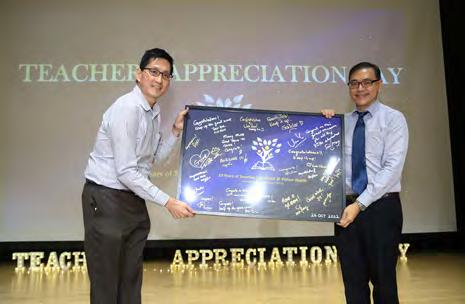


In his opening address, A/Prof Yip Chee Chew, Education
Director, Yishun Health, thanked the clinical heads of departments for their support in the last decade. Reflecting on EDO’s continuing efforts in supporting the teaching and learning of all healthcare professional groups, he shared that the department’s mission of creating a conducive learning environment was made possible by the combination of adequate infrastructure, passionate people, and intuitive systems.
During the event, awards were given out to recognise teaching excellence across the range of medical professionals. Our educators were honoured with touching music videos, songs and video messages recorded and performed by their students. A special performance was also put up by our very own staff as a heartwarming way of expressing their care and passion for the next generation of clinical students.
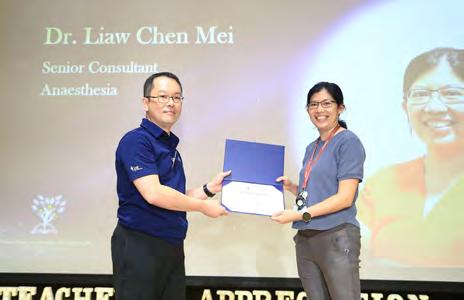
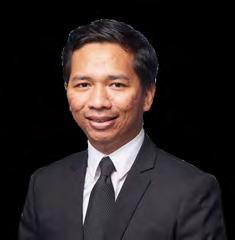

The National University of Singapore (NUS) Yong Loo Lin School of Medicine Dean’s Office held its NUS Medicine Appreciation for Clinical Educators 2022 on 4 October 2022. This virtual ceremony acknowledges the contributions of healthcare clinicians in furthering medical education.
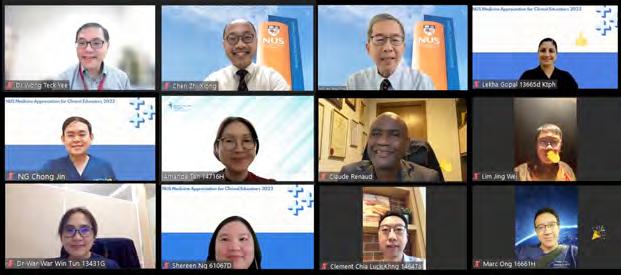
This year, 13 recognitions were conferred upon Yishun Health, with the Department of Anaesthesia receiving the Clinical Training Excellence Award for the fourth time. Students praised their teachers for their knowledge and mentorship, as well as for the valuable chance to experience a wide range of medical scenarios.
On 31 October 2022, the Lee Kong Chian School of Medicine (LKCMed) held a ceremony to acknowledge the contributions of Yishun Health in teaching and research supervision of their students during the 2021–2022 academic year. A total of five individuals and departments were cited for their outstanding contributions.
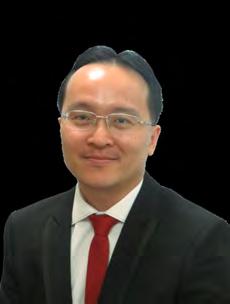
With macular degeneration now estimated to affect five out of every 100 individuals — a rate likely to increase, given the growing number of Singaporeans who have diabetes — the battle against macular diseases has gained greater momentum.
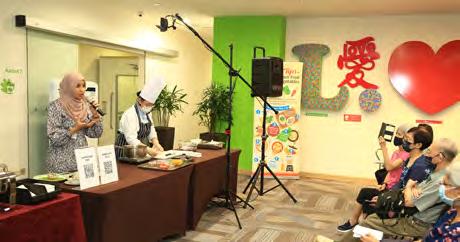
To this end, the team from KTPH Ophthalmology & Visual Sciences (OVS) has broadened its efforts to raise awareness about all macular diseases, and tweaked its annual AMD Week to stand for not just ‘Age-Related Macular Degeneration Week’ but ‘Awareness of Macular Diseases Week’.
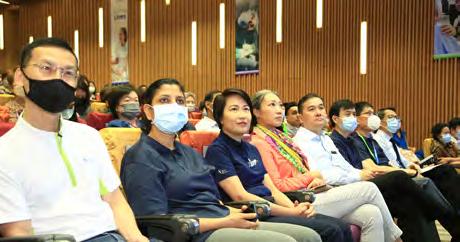
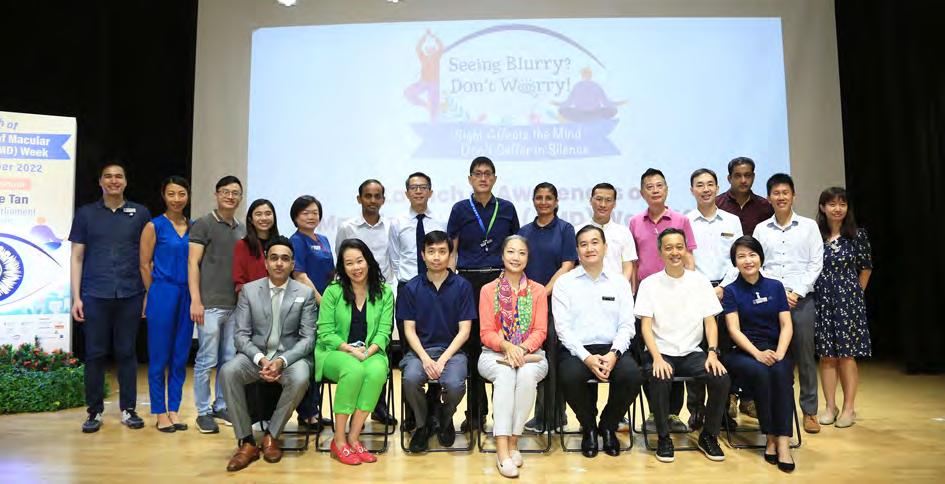
Into its 18th run, this year’s AMD Week continued in its mission to spread the message of regular screening and the resources available. Themed ‘Seeing Blurry? Don’t Worry!’, this year’s event returned to its in-person format on 8 October 2022. AMD Week 2022 aimed to address both the physical and the mental well-being of seniors at risk of macular diseases. Visual impairment can affect quality of life, increase the risk of falls, and affect mental health.
Loss of vision has been associated with loneliness, social isolation, and feelings of worry, anxiety and fear. This underscores one of the important messages of the event, which is to go for eye screening regularly so as to enable early detection and treatment.
To celebrate World Mental Health Day, the Department of Psychological Medicine organised a two-day event on 10 and 11 October 2022 for Yishun Health staff and members of the public.
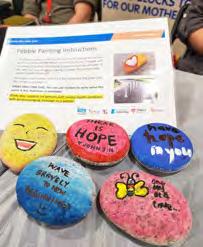
A series of talks, workshops and exhibition booths were set up to provide self-help tips and resources to encourage all to ‘Speak Up, Seek Help’ and ‘Reach Out, Help Others’. Ms Charlene Heng, Head of Training and Development, Samaritans of Singapore, also held a talk on suicide prevention.
To drive home the message of mental wellness, three workshops on art and music therapy were held for staff to highlight topics such as mindfulness and the management of stress and anxiety. They included printmaking and comic-strip making, which are helpful ways to channel and express emotions healthily. Staff also took turns to paint pebbles with messages to encourage persons with mental health conditions, and take part in a unique VR experience to roleplay helping a friend with depression.
September 2022 marked a month of physical and virtual wellness activities as Yishun Health held its inaugural Wellness Festival organised by the HR Wellness Team. The initiative aims to encourage staff to embrace physical and mental wellness as a lifestyle.
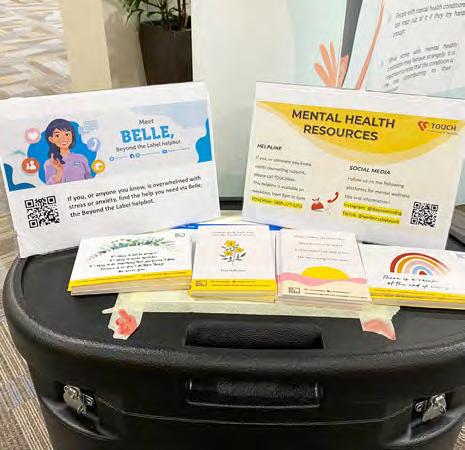
On 1 September 2022, the Festival took off to a good start with a 1.6km walk around the Yishun Pond as part of a month-long Fitness Challenge. In all, 2,700 staff across 289 teams clocked their daily steps through the mobile application, with one even surpassing three million steps!
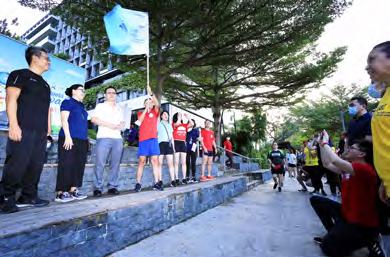
Throughout the Festival, there were health workshops held by Rehabilitation Services and Podiatry, cooking demonstrations run by
Nutrition & Dietetics (N&D), as well as group workouts, terrarium crafting, and aromatherapy classes. Staff also embraced the outdoors and went on long hikes around Singapore, from Henderson Waves to Woodlands Waterfront Park. Other events included a Wellness Bazaar organised specially for staff to peruse booths set up by N&D, Food Services, PALS, Healthcare Services Employees’ Union, ActiveSG, and external vendors. In tandem with this event, the one-stop digital portal, Care@Workplace was launched on Yishun Health’s Workplace to offer access to 24/7 mental health and wellbeing advice and resources.
During the closing ceremony of the Festival on 10 October 2022,
individuals who embraced the spirit of whole mind-and-body wellness were recognised for their participation, which made the Festival a success.
Yishun Health has officially launched our Butterfly Garden as part of our own Clean and Green Week. Organised by our Green and Sustainability Committee, events were held from 23 to 25 November in conjunction with the Clean and Green Singapore 2022 movement.
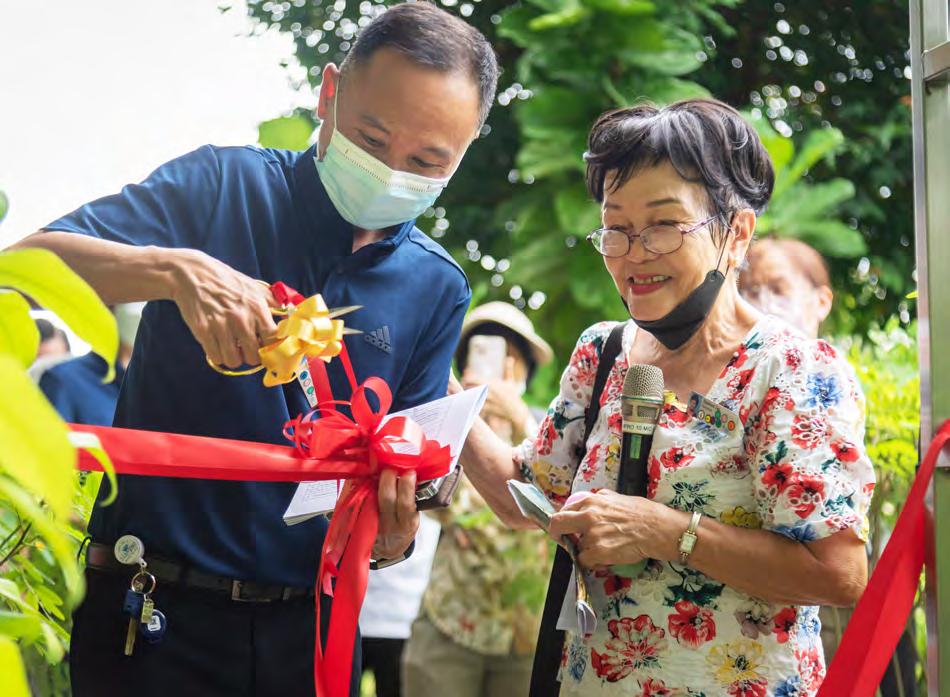
The Butterfly Garden, located between Tower B and the pre-fab building, not only adds beauty and greenery to our grounds, but conserves native flora and fauna and celebrates the contributions
of our butterfly enthusiasts and volunteers.
As part of the launch on 25 November, guests toured Yishun Health’s rooftop garden to learn about its aquaponics system and viewed the ‘Sustainable Living & Environment Protection’ exhibition at the KTPH main lobby.
As part of our move towards zero waste and sustainable living, staff and visitors were encouraged to donate their pre-loved clothing and to use their own bag at the ‘Buy Green, Stay Healthy’ bazaar.
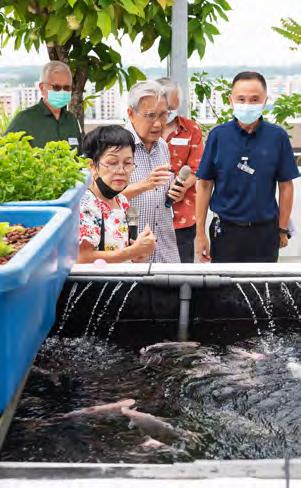
After being diagnosed with breast cancer, 41-year-old Mdm Lim made the decision to undergo breast reconstruction surgery. In a life-changing, seven-hour surgery under the coordinated care of a multidisciplinary team of KPTH doctors, nurses and occupational therapists, Mdm Lim had a successful procedure and made a full recovery.
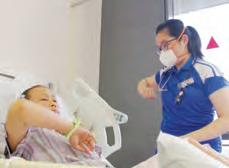
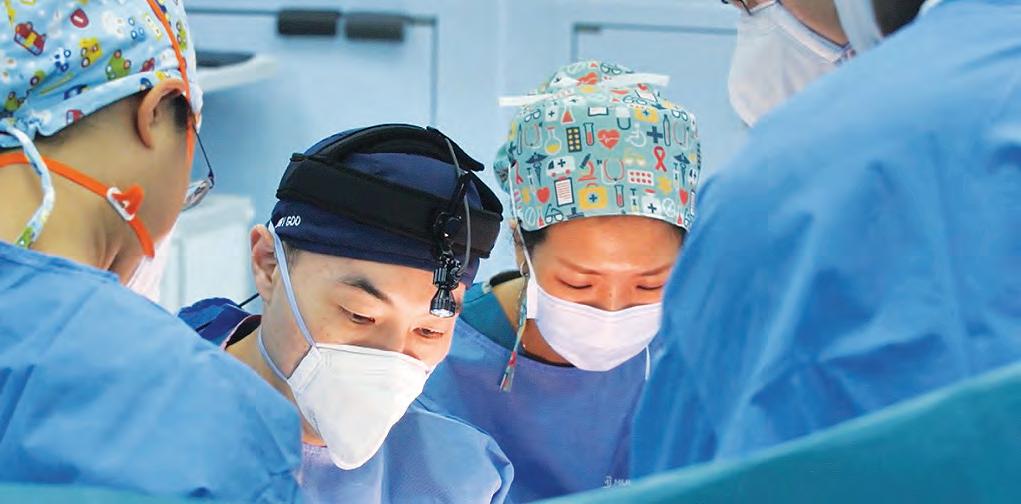
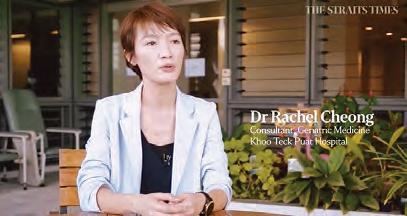
Scan the QR code to catch Mdm Lim’s story on the premier episode of Channel U’s docuseries, Inside OT.
Afeature in the national broadsheet sheds light on dementia, and hopes to create greater awareness about the condition. In it, the Geriatric Medicine team shared useful information on the range of dementia care services available at KTPH, including a helpline for caregivers.
Scan the QR code to view the news article and watch the video, Living Outside with Dementia.
Some of us may still be reeling from the excitement surrounding the FIFA World Cup 2022! In December 2022, we hit the streets to ambush our staff and get their candid thoughts on the matches.

Scan the QR code to hear their spontaneous responses, and see for yourselves whether any of their predictions came true.
Be sure to like and follow our Facebook page @khooteckpuathospital for the latest updates!
When the kidneys fail, they can no longer perform their filtering function. This leads to the build-up of waste, which can throw off the body’s chemical balance. Dialysis is a treatment that removes the waste and helps to restore equilibrium.
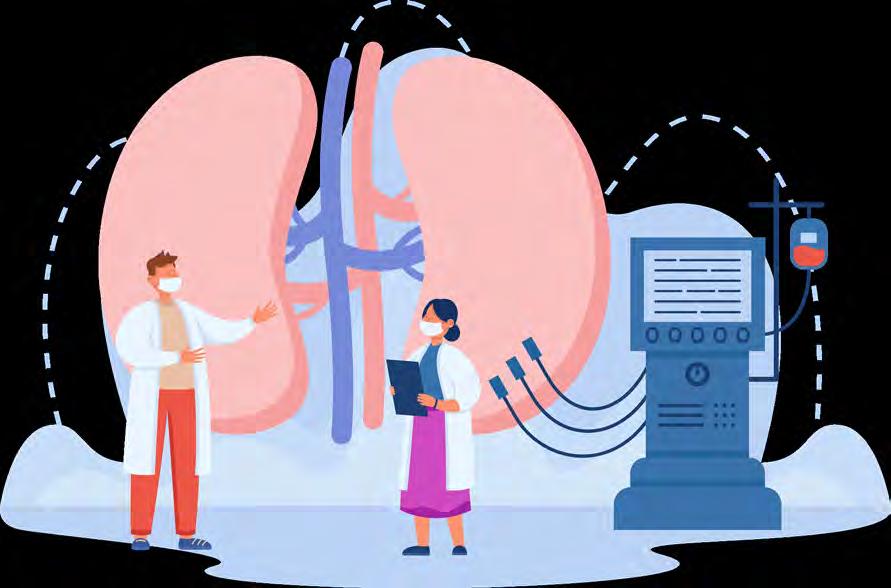
In consultation with Dr Liu Bo, Consultant, General Medicine (Renal), KTPH
There are two types of dialysis: haemodialysis (blood dialysis) and peritoneal dialysis (water dialysis). Both treatments offer comparable outcomes.
Haemodialysis cleans waste products from the blood using a special machine with an artificial dialysis filter. On the other hand, in peritoneal dialysis, a
special fluid is introduced into the body through a small tube that is surgically placed in the abdomen. This procedure uses the lining of the abdomen to act as a filter to remove waste products from the body.
Peritoneal dialysis can take place in two ways: Continuous Ambulatory Peritoneal Dialysis (CAPD) and Automated Peritoneal Dialysis (APD).
CAPD is a daily manual treatment that can be done several times a day at home. This method involves introducing the fluid into the abdomen and draining it out after about four hours. The exchange process takes around 30 minutes. During this time, you can continue with normal daily activities.
APD is done at night during sleep. It uses a cycler machine to deliver and then drain the fluids. It is done daily and takes eight to 10 hours. You can continue with normal daily activities during the day.
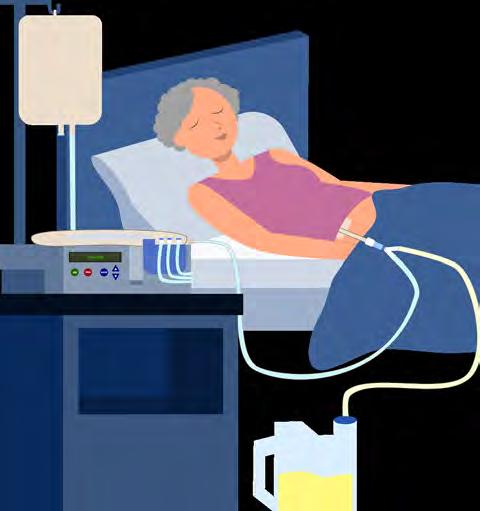
Dialysis solution
Here are five things to keep in mind about peritoneal dialysis: Drainage bag


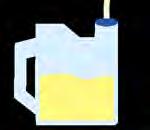
A dialysis catheter will be surgically placed in the abdominal cavity to create an access point for the treatment. This surgery can be done percutaneously (through the skin using an injection method), using laparoscopic surgery or as a small open surgery. Your doctor will discuss with you to decide the best way of placing the peritoneal dialysis catheter. This may involve a short hospital stay or day surgery.
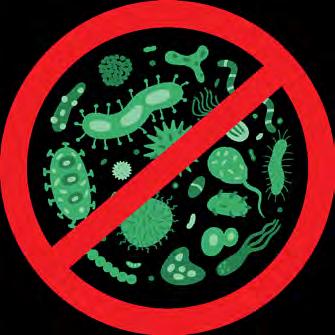
The dialysis catheter acts as an access point and must be protected against infection, especially where it enters the abdomen. Care must also be taken to prevent germs from entering the body as they can infect the abdominal lining (peritonitis). To help manage this risk, you, your caregiver and/or family will be taught how to keep the site safe and sterile.

As peritoneal dialysis is home-based, there is no need to go to the dialysis centre at three fixed times a week. You have flexibility and control over treatment timings, which means greater freedom for work, play and other activities. People on peritoneal dialysis can also travel because dialysis fluid can be delivered to your destination so you can continue treatment while on holiday.
In peritoneal dialysis, the constant presence of the dialysis solution in the body allows waste from the blood to be removed continuously, making it gentler on the body. It is associated with fewer side effects, such as low blood pressure. Some people also have fewer diet restrictions than they would had they been on haemodialysis.
Peritoneal dialysis has some clinical benefits, too. Studies indicate that it may retain residual kidney function slightly longer than in haemodialysis. It is important to preserve your own kidney function even after starting dialysis as this helps you stay healthier and live longer.
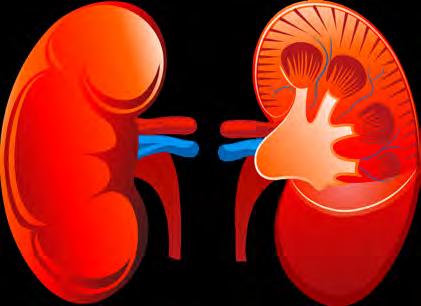
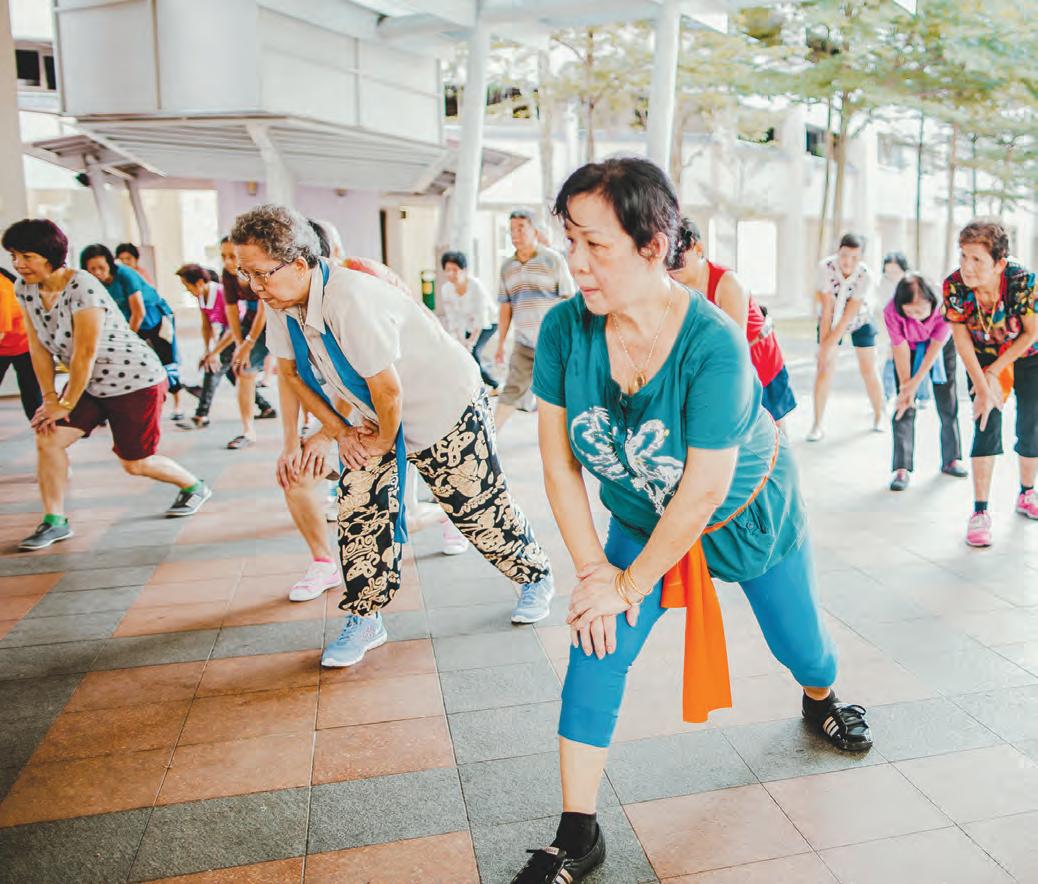
The way we practise medicine has changed radically. As we move away from traditional professionally driven care towards a more person-centred approach, we are giving people more autonomy to become active participants in their own health. This is where Personalised Care and Support Planning (PCSP) will play an important role.
Six months ago, Mdm A, 70, who struggled with diabetes, sought advice at the Community Health Post (CHP) located at Muhammadiyah Senior Activity Centre. During the visit, she was surprised to have the opportunity to speak about her concerns — a contrast to her past experiences, in which healthcare professionals did the bulk of the talking. After sharing her concerns, she felt heard and understood. Moreover, the advice she received was relevant and easy to integrate into her lifestyle. When community nurse Zarina binte Kamis discovered that Mdm A’s daughter was the person-in-charge of the household groceries, she roped her into the care team.
Now, Mdm A — accompanied by her husband and helper — can be seen taking brisk walks around her neighbourhood almost every day. Encouraged by her community nurse, Mdm A also ensures she has a
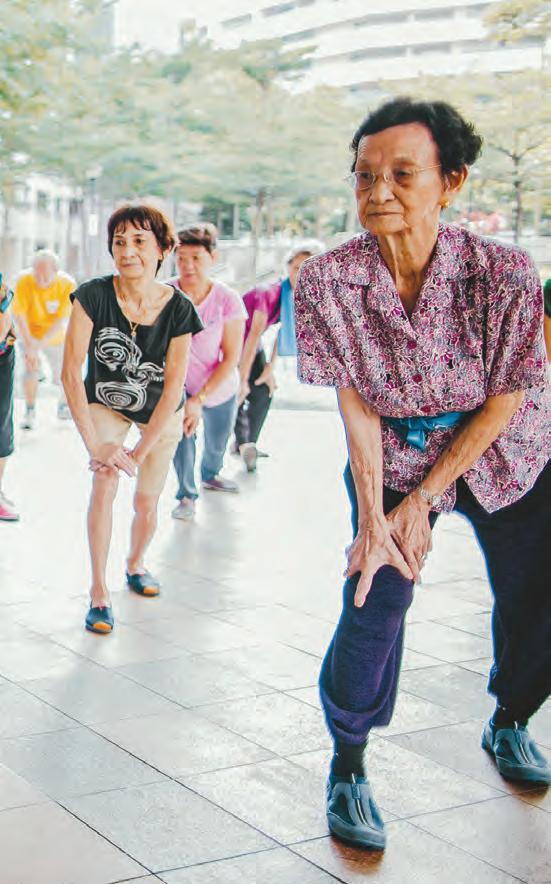

‘healthy plate’ at mealtimes, and is conscientious about taking her medications both before and after eating. These three new healthy habits have energised her and kept her diabetes in check.
Mdm A is not the only one who has benefited. Her husband — who also has diabetes but is not as diligent in his medical follow-ups and medication regimen — has been inspired to follow his wife’s example. These days, he keeps up with his appointments, sticks to his medication schedule, and goes for daily walks with her. Having learnt to monitor their blood sugar levels, both husband and wife cheer each other on to achieve optimum blood sugar levels. Together, as a team — and supported by their community nurses — they are now both living well with their conditions and are confident in being fit and healthy.
As we move towards embracing a much more population-centred approach towards healthcare, the goal is for experiences like Mdm A’s — where people with long-term conditions are encouraged and equipped to self-manage their health while being supported by a care team — to become the norm.
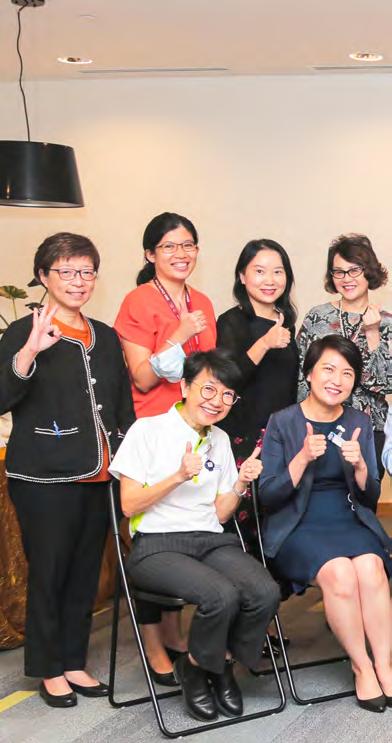
For Yishun Health’s Population Health and Community Transformation (PHCT) team, one way to do this has been to take the PCSP approach. Dr Wong Sweet Fun, Deputy Chairman, Medical Board (Community Care & Population Health), and Clinical Director of PHCT, explains, “Instead of dispensing standard health advice, we have conversations with each person to define their personal life and health goals, have them take ownership of these goals and then, together, we find ways to achieve them.”
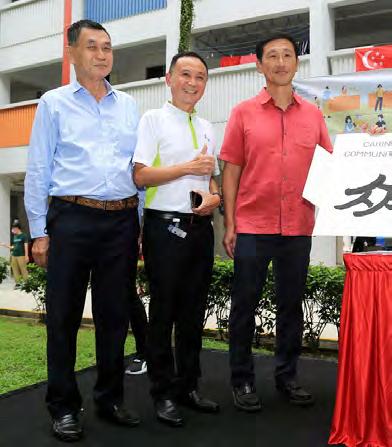
These goals can encompass a wide range of emotional, functional, financial and social elements to create a holistic understanding of people and their unique life situations. This is based on a core principle in PCSP, where patients are first viewed and valued as persons, and are engaged as primary decision-makers regarding their own health conditions. “It goes beyond going through test results, prescribing medications, or setting a laundry list of clinical and functional targets to hit. It’s about really engaging people to understand their own personal goals, expectations and purpose in terms of responding to the illnesses and issues that they face. Based on this, the care team finds ways to support them,” says Elaine Toh, Executive Director, Regional Health Office, Yishun Health.
PCSP emphasises the significance of the role that individuals play in determining their own health outcomes, given that they spend more time managing their health — for example, choosing the food they eat, their daily activities, and lifestyle habits — outside the hospital than inside it.
“Instead of dispensing standard health advice, we have conversations with each person to define their personal life and health goals.”
(far left) Minister for Health Mr Ong Ye Kung at the launch of PHCT’s Caring Communities, a book on how health is practised in the community
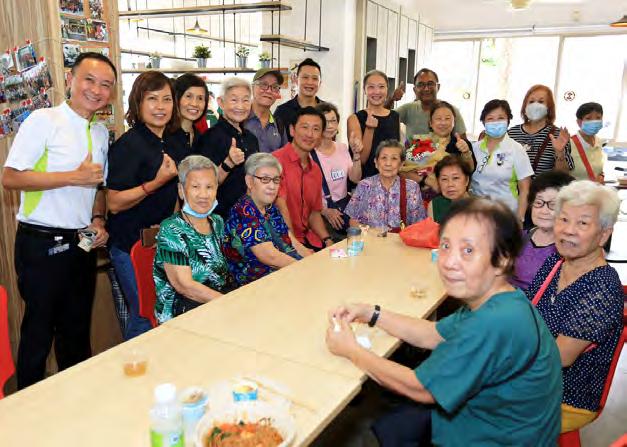
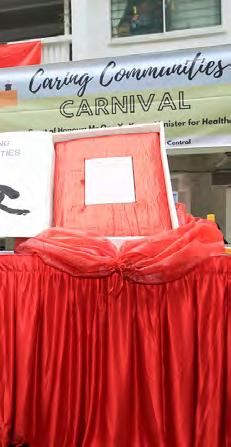
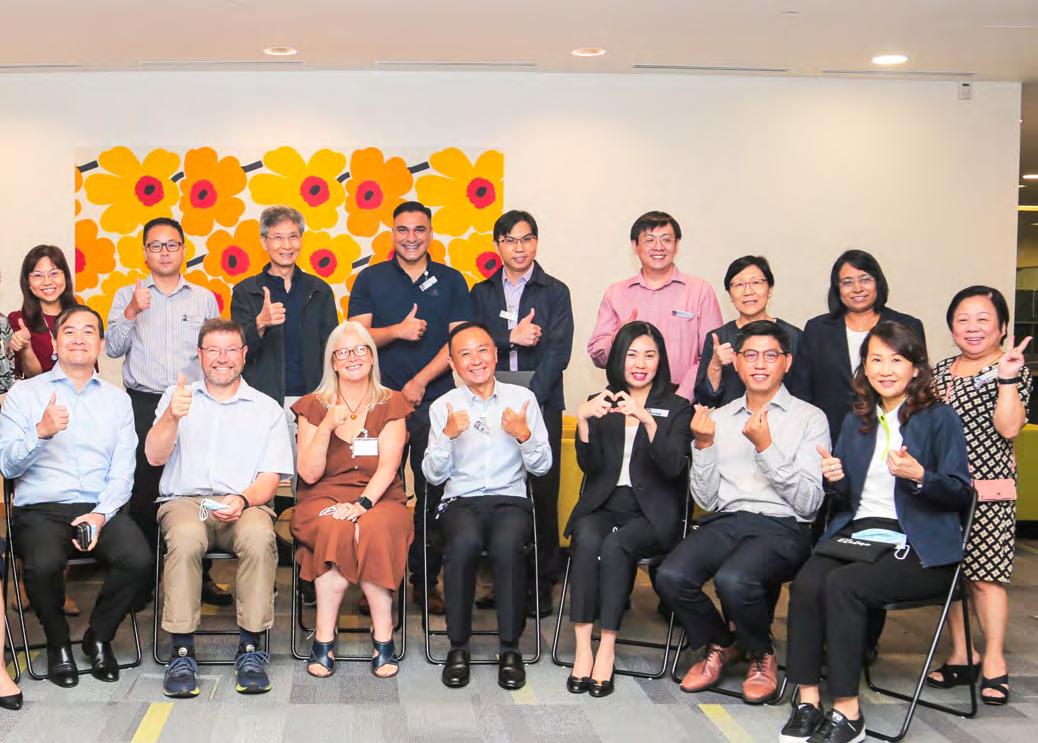
(left)
Residents gathering at the Wellness Kampung to join in the Caring Communities Carnival in September 2022

According to A/Prof Pek Wee Yang, Chairman, Medical Board, Yishun Health, this is a defining factor to achieving sustainable health outcomes. “People spend just a few hours a year in consultation with their doctors — how do we then engage them in a more meaningful way to sustain their long-term health? PCSP helps us partner them to make changes in their lives that are practical and long-lasting.”
“Significantly, these conversations shift the control back into the hands of people,” emphasises Prof Chua Hong Choon, CEO, Yishun Health. “We recognise that people bring their lives, personal assets, strengths and abilities into the mix. Guided by the PCSP conversation, we co-build solutions that work for them and can be integrated within their daily routines. This goes way beyond what we would be able to prescribe traditionally.”
When done well, Dr Wong adds, PCSP widens the conversation to reveal motivations and barriers that can be addressed to achieve better overall wellness. The effort also helps to build trust and cultivate relationshipbased care through a collaborative style of consultation so that patients retain their choice and control over their own care goals as well.
Take another resident, Mdm S, an unemployed single mother with two children. During PCSP conversations with her, Cassandra Quek, a Community Connector in PHCT, uncovered that Mdm S’s worries revolved around financial instability, an estranged relationship with her older son, feelings of stress, and lack of sleep. Above all, what mattered most to Mdm S was “getting it right this time” in being a better mother to her infant daughter.
Though Mdm S had health issues, such as a BMI of 34 and a smoking habit, these were not priorities for her at that moment. Hence, Cassandra first guided Mdm S on how to manage her emotions and interpersonal relationships. This complemented
the family relationship advice offered by her social worker at Yishun Family Service Centre @ Singapore Children’s Society, who also expedited Mdm S’s infant care application for her daughter so she could take on part-time work. The social worker then opportunistically
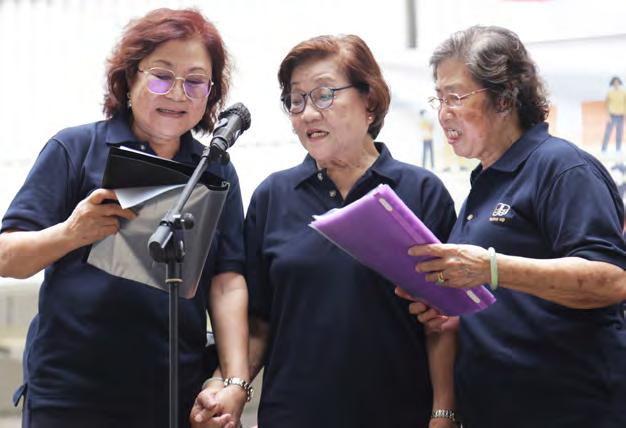
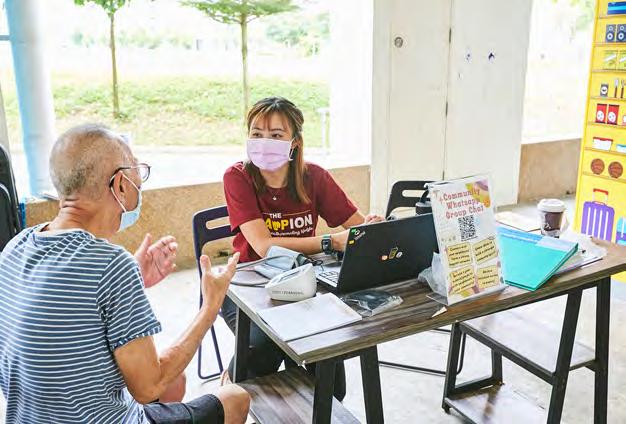
introduced Mdm S to resources, such as upcoming health screenings and smoking cessation services, to address these needs whenever she was ready.
To ease Mdm S into taking better care of herself, Cassandra also highlighted the benefits of obtaining a CHAS card — which Mdm S successfully applied for on her own — and encouraged her to monitor her blood pressure at the Community Health Post. This was just the start of a continuing conversation towards greater stability in Mdm S’s finances, health and well-being so that she can support her family well.
This story showcases what it means to consider someone’s needs holistically and see them as people whose being extends beyond the medical. “Although health is our primary concern, we understand that it is not always first on someone’s mind,” Ms Shirley Heng, Chief Nurse, Yishun Health says. “What we do is work with them on what matters to them; thereafter, we can slowly move towards the health conversation. We want to walk alongside people and nudge them into healthier actions and choices, rather than simply telling them to adhere to what we think is best,” Ms Shirley adds. As a result, there is a greater level of activation and ownership of the care plan, because the person in question has made those decisions and will be more motivated. For the care team, PCSP also allows for greater care coordination to address a person’s concerns.
PCSP is part of a much broader overall mission at Yishun Health to
grow its House of Care.
The House of Care represents all the different elements needed to ensure that all residents have a One Care Plan that emphasises a fit and healthy life and hassle-free access to safe and value-driven care provided by collaborative teams and networks.
This mission is also aligned with the national Healthier SG drive towards greater preventive care. Simply put, it places a stronger emphasis on proactively preventing chronic illnesses and their complications by promoting early detection, and empowering patients to take charge of their health through lifestyle changes.

PCSP takes place at the heart of this House of Care, forming the link between patients or residents and their care team. Dr Wong explains,
“It is not just a document set in stone or limited to nurse- or doctor-patient interactions. The planning is crucial — achieved through meaningful conversations together — to ensure the success of the relationship between the Health & Care Professional and the patient or resident, and the eventual execution of the plan, which leads to better health and social outcomes in the long run.”
“We are changing the paradigm of recovery and health,” says Prof Chua. “More and more, we are seeing that the very best outcomes are achieved in patients who partner their healthcare team in the journey of health, recovery and maintenance of quality of life. We are embracing a more populationcentred approach towards health care, not just illness care.”
consultation with Chow Pek Yee, Head and Principal Dietitian, Nutrition & Dietetics, Yishun Health
My father has kidney problems and high blood pressure. What can I do to ensure our reunion dinner steamboat is appropriate for his low-sodium/lowprotein diet?
For a healthier steamboat dinner, remember these tips:
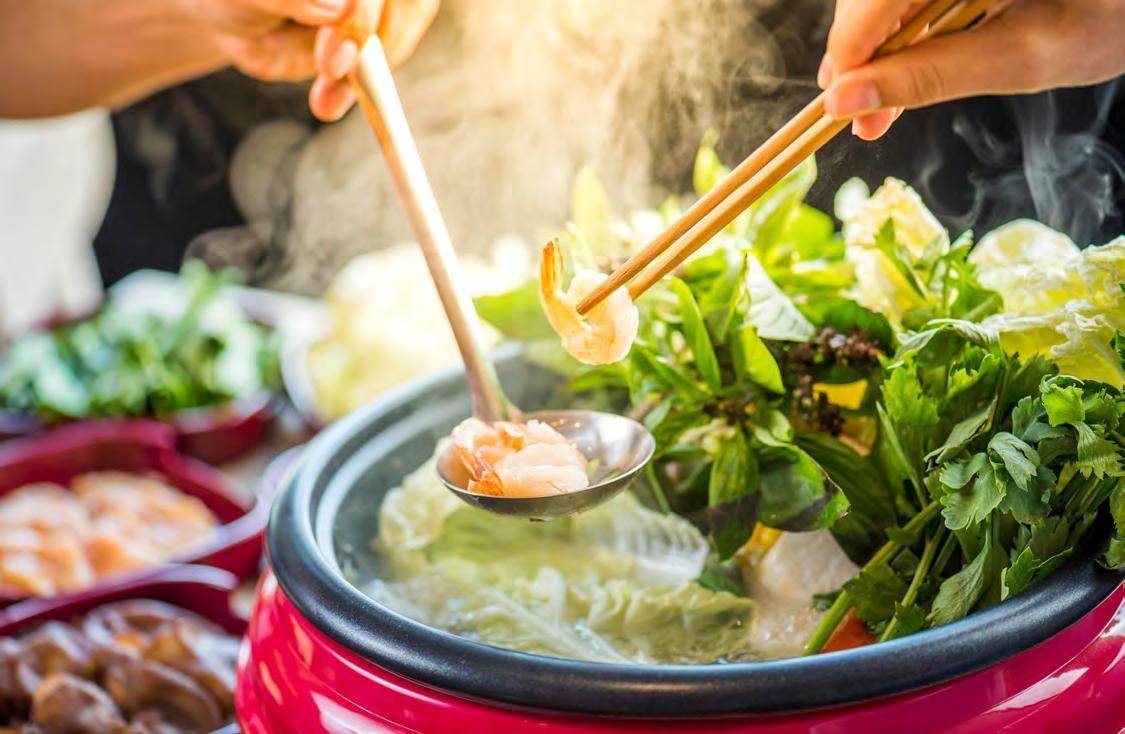
• Avoid drinking the soup; if needed, limit yourself to one small bowl (150ml)
• Use a clear soup base or a homemade, lightly seasoned broth instead of a spicy and high-fat broth such as mala or laksa
• Most sauces are high in sodium; minimise the use of sauces and enjoy the natural flavour of the ingredients
• Have natural condiments such as cut chilli, ginger, garlic, vinegar, lime or sesame oil
Yishun Health experts answer your frequently asked questions about health, well-being and medical conditions. In this issue, we answer questions from people worried about their diet over the festive Chinese New Year period.
• Choose whole food instead of processed or canned food to minimise sodium intake
• For patients with kidney failure, portion out the dishes and leave the soup behind before eating
Some of my family members have chronic conditions. Every Chinese New Year, I worry about the festive snacks and drinks that they consume. Can you share some tips to manage this during this season?
All Chinese New Year goodies symbolise a prosperous new year and are a large part of the festivities. You can offer a variety of such treats, but follow these rules of thumb:
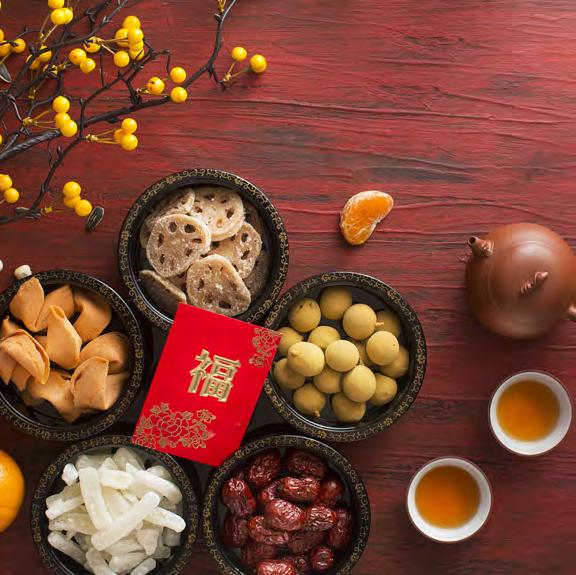
Energy Balance: Energy In = Energy Out
Excessive caloric intake that is not expended will lead to unnecessary weight gain during the festive season. Be mindful of these points:
• It will be better to have healthier choices within reach; however, QQF is still key
• Hydrate with refreshing fluids such as water flavoured with frozen grapes, berries or mint leaves instead of sugar-sweetened beverages
Before you snack on these goodies, consider the number of floors you have to climb to work off the caloric intake! (1 floor = 16 steps)
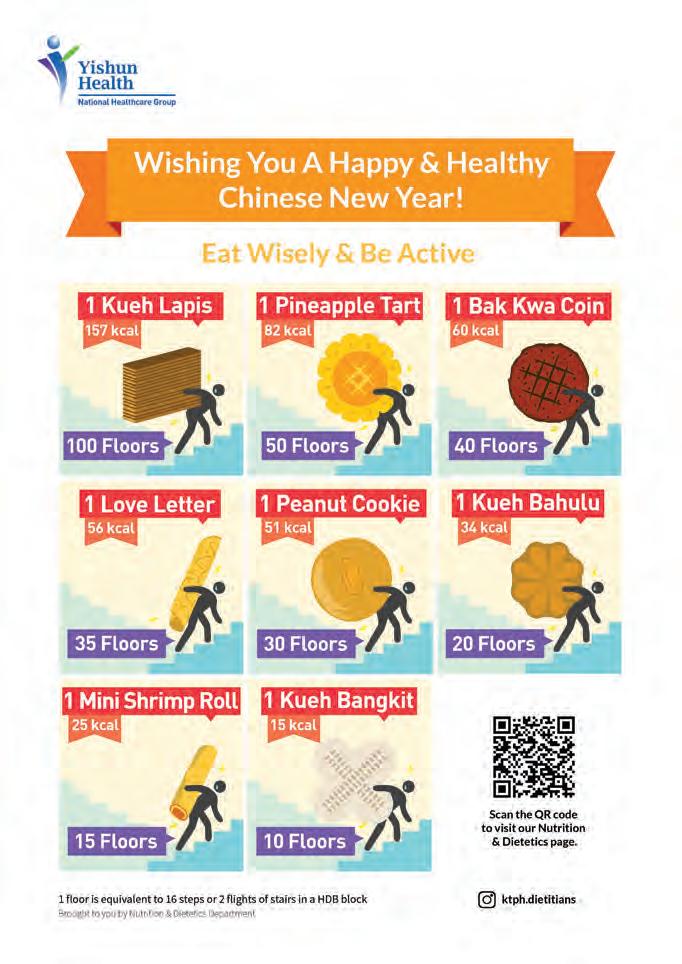







Recognising that some of his neighbours were struggling during the pandemic, Azaree Atan teamed up with his community to set up a small food bank to provide essentials to those in need.
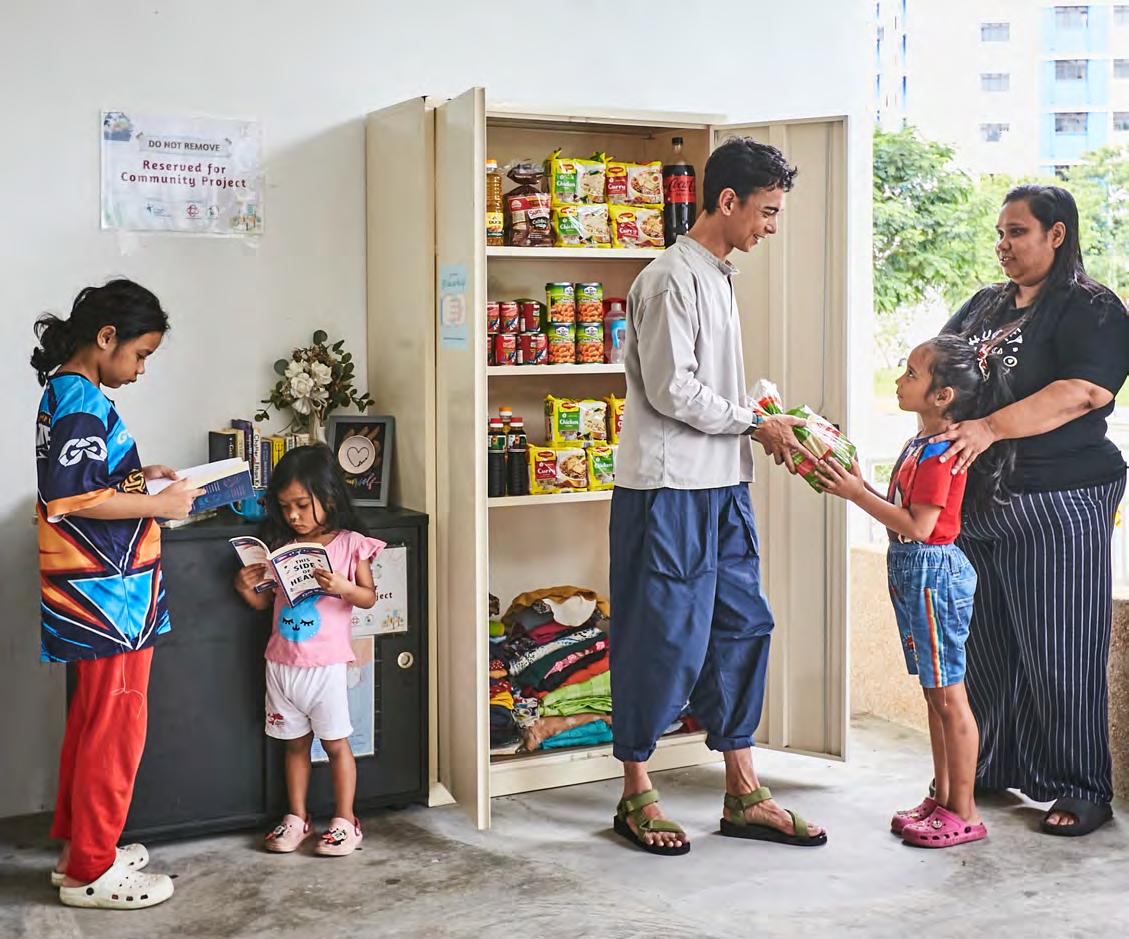
When we give cheerfully and accept gratefully, everyone is blessed. This is the spirit of Blessing Corner at Sembawang Crescent, where residents have come together to look out for one another.
Stocked with food staples, the resident-run community pantry was started as a space to allow residents to give what they can and take what they need — anonymously and discreetly. This, explains one of its co-founders, Azaree Atan, is a way
to not only help the community take more ownership, but confer dignity to recipients as well. “Not everyone is willing to come forward to ask for help even though they are in need,” he observes. Providing a community pantry that is readily accessible helps
ensure that those flying under the radar do not fall through the cracks.
It all began in 2021, when Azaree began thinking about how to do more for the residents in his neighbourhood. “We knew that many of the people living in rental flats in our area were struggling financially,” he recalls. Talking with his friends in the neighbourhood WhatsApp group chat, they brainstormed for ways to help them.
This led to the idea for Blessing Corner. It took six months and many Zoom calls to organise, and another six months of waiting before they got the approval and official goahead. In early 2022, the little space began operating.
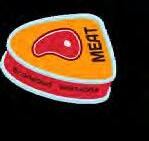
Though it is still fairly young and small in scale, Blessing Corner symbolises more than a place where food can be shared. Azaree envisions for it to become the starting point from which the neighbourhood can build greater connections, support each other, and make the space their own.
Apart from ramping up awareness and in-kind donations to keep the pantry well-stocked with essentials, the team hopes to increase the scope beyond food. “We are also hoping to collect books to create a little library for the children in the area.” Azaree hopes this will help the corner evolve into a shared space that can be used and enjoyed by all.
The notion of a safe space and a caring, supportive community means a lot to Azaree. He shares that he was incarcerated for six months in 2018 for drug-related offences. During that period, he reflected deeply on his own life and the ways he could become a better, more productive member of society. “I had done so much just for myself,
Azaree took the initiative to make a change in his community by starting the Blessing Corner, a small food bank for neighbours in need.
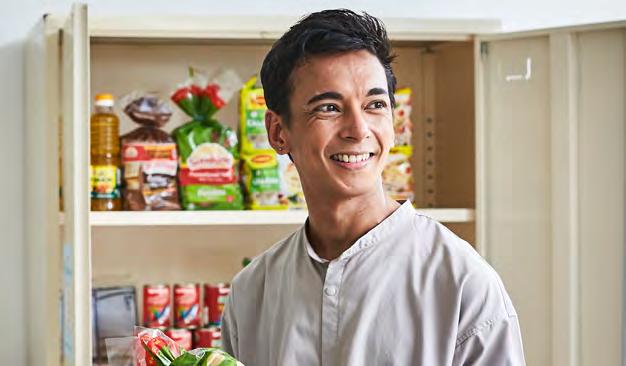
but not much for the community,” he remembers thinking.
Since his release, reaching out and connecting with various communities has become an important part of Azaree’s recovery. In fact, he volunteers and works with a few social organisations, such as the Singapore Anti-Narcotics Association and the Calm Collective Asia (a mission-driven organisation that aims to normalise mental health conversations), and is a grassroots leader for his Residents’ Network. “These have been judgement-free safe spaces for me and others to share stories and gain support,” he says. He also brings his many experiences and learning points into the work with Blessing Corner.
Azaree encourages more people to step up to contribute in whatever way they can. It is very rewarding to know that even the humblest of offerings — a packet of noodles, a can of milk, or some biscuits — can go towards making someone’s day a little better, feed a hungry stomach, offer nourishment, or be enjoyed as a treat. Azaree finds it heartwarming to also see how residents who receive these gifts take only what they need and ensure there is still enough to go around for others. “I hope we can build our connections and get more people to join us and take ownership of this to truly add to the kampung spirit in building a healthier and happier community!”
Blessing Corner, located at 364A Sembawang Crescent, accepts donations of dry, shelf-stable food items with at least six months left on the expiry date.
• Rice and noodles

• Oil
• Sugar

• Canned vegetables and meats

• Biscuits
• Coffee, tea and other dry drink mixes
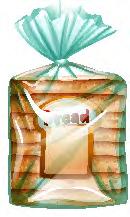
At Yishun Health, dietitians play an important role in almost all settings of care. Beyond overseeing diets for therapeutic purposes and as part of clinical flows, they also channel their passion for food, health and people into their work, journeying with patients and the community at large to achieve sustainable health and wellness.
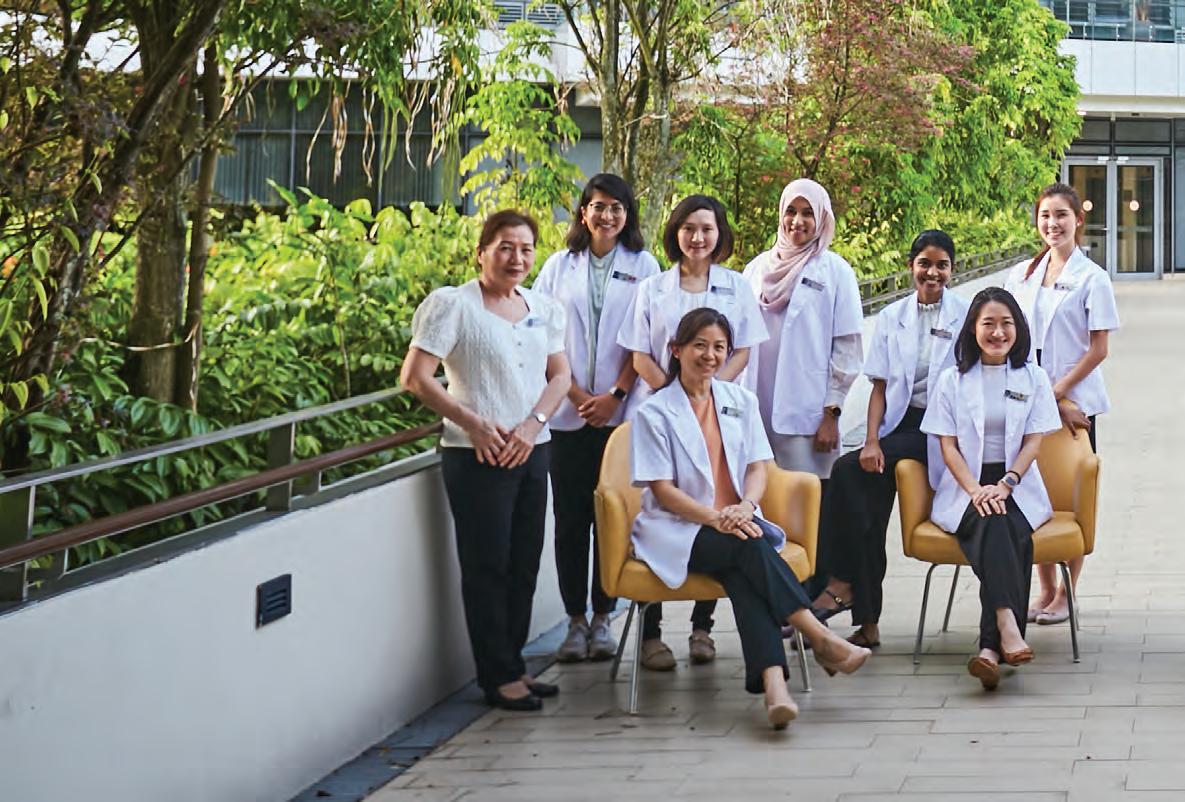
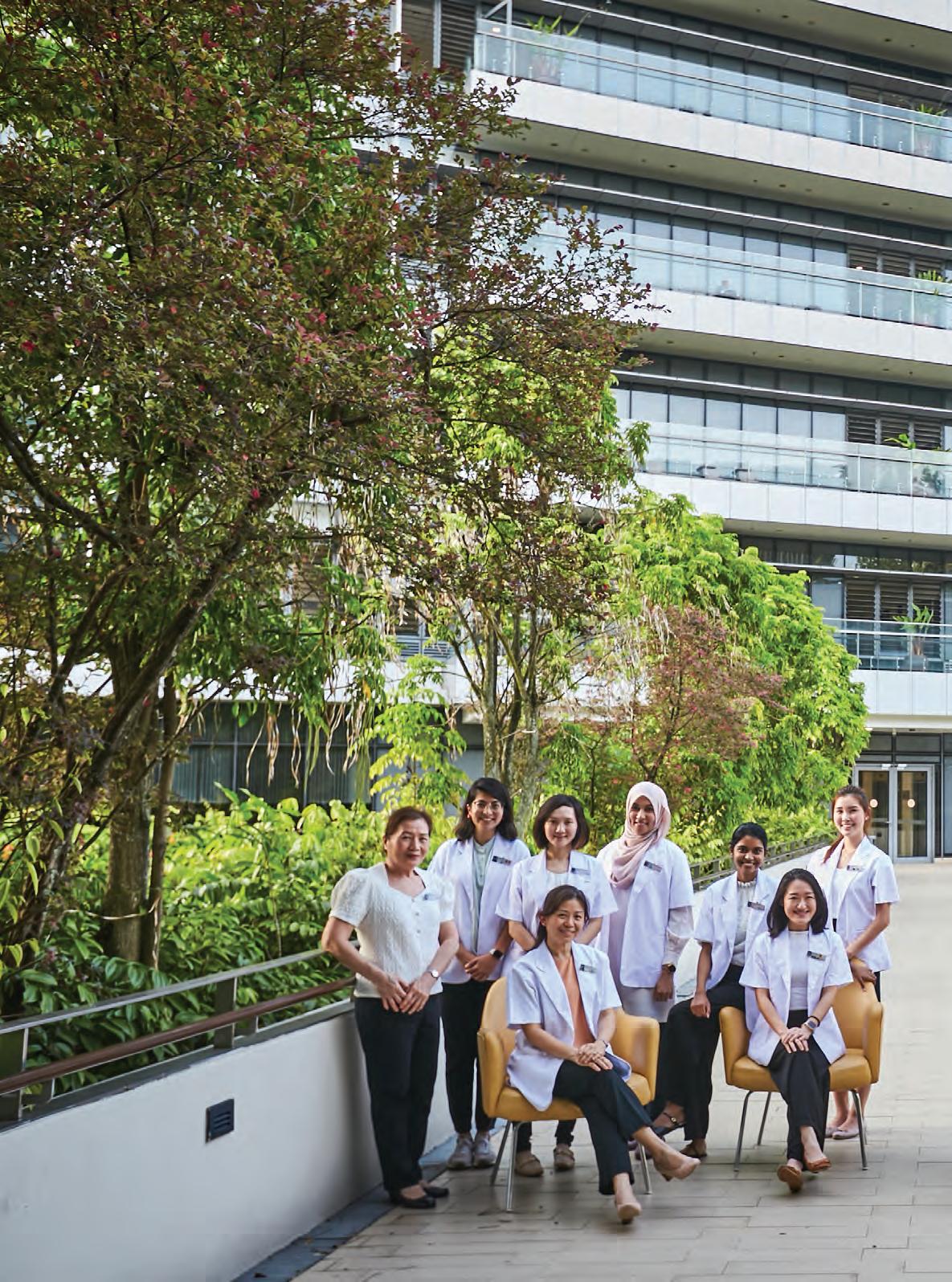
Food is an integral part of the human experience. It sustains us in more ways than one, and is deeply interwoven into our lives. In addition to maintaining our physical, mental and emotional health, food also has many cultural and social associations, and is even how some of us express ourselves and our personal beliefs. This makes dietetics a very interesting, diverse and dynamic field, as it integrates evidence-based science with whole-of-person care.
According to Chow Pek Yee, Head of Nutrition & Dietetics (N&D), Yishun Health, dietitians are trained and qualified to assess, diagnose nutritional issues, and provide medical nutrition therapy to manage and prevent disease as well as optimise health. As allied health professionals, dietitians contribute their expertise as members of multidisciplinary healthcare teams across many
points in the spectrum of care. These wide-ranging roles extend to, but are not limited within, the settings of:
• Clinical inpatient
• Outpatient
• Intermediate care
• Food services and operations
• Staff health and recipe development
• Outreach and community
Hippocrates once advised, “Let food be thy medicine.” This is relevant when we are unwell. When patients are admitted into hospital, it is important that they have sufficient nutrition to support their recovery.
Teoh Huiru, Senior Dietitian, N&D, Khoo Teck Puat Hospital (KTPH), explains that clinical dietitians like herself see

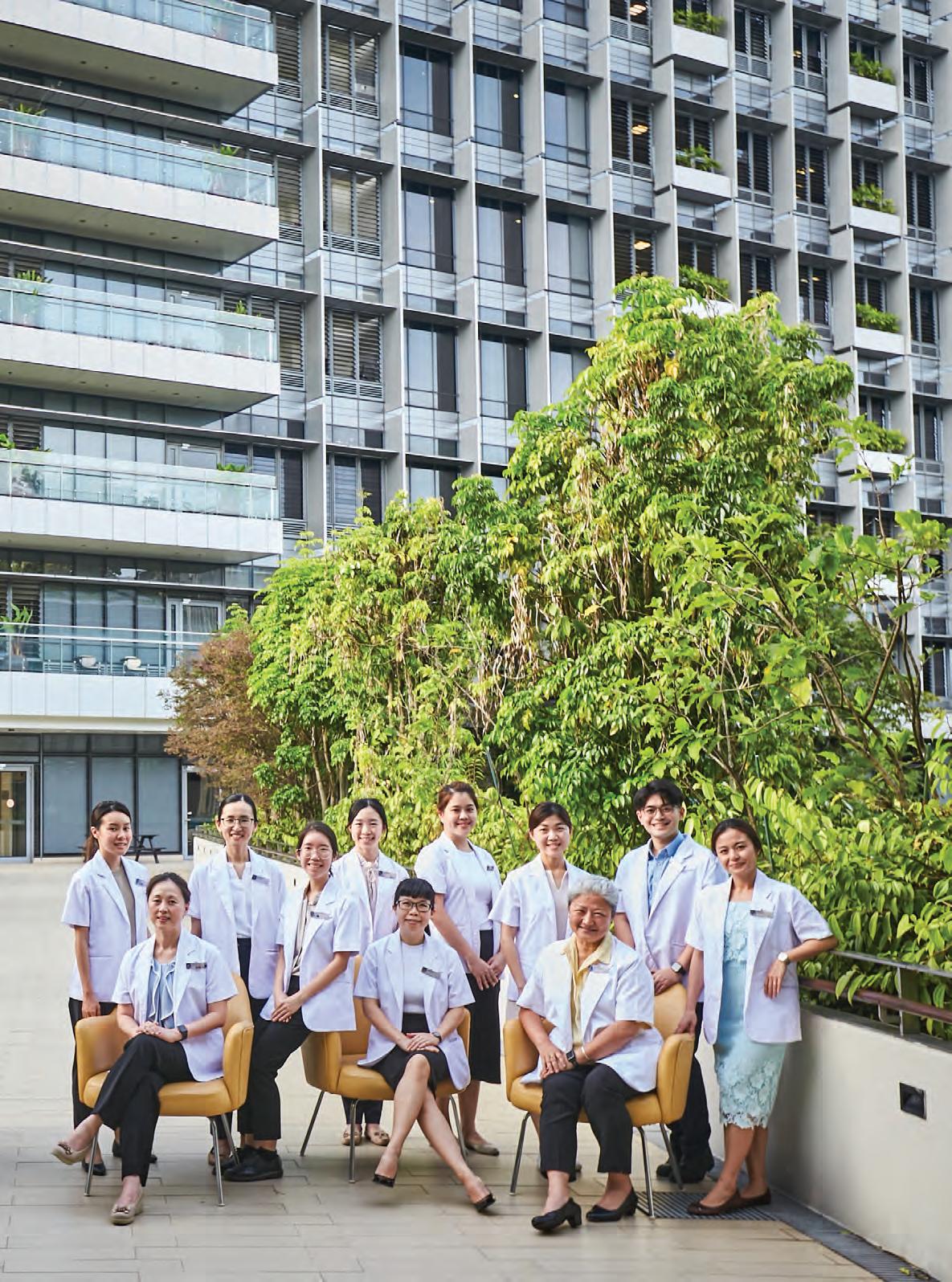
to the specific dietary needs of inpatients. This includes specialised therapeutic diets for those with chronic conditions such as diabetes, heart disease, chronic kidney disease, and more. Additionally, she manages alternative modes of feeding, such as via a feeding tube or intravenous means. “We also make sure that the diets for patients who are not eating well are reinforced to help them with their recovery and wound healing,” she adds.
This sees her collaborating closely with various clinical disciplines and specialty healthcare teams, ranging from gastroenterology and surgical to geriatrics, intensive care, and more. There is more to the work than prescribing specific diets; together with the N&D team, she also develops workflow and intervention protocols for doctors and nurses so that appropriate feeds can be given in a timely manner.
Beyond patient-facing work, dietitians also attend to back-end matters to support their wideranging efforts. To ensure that therapeutic diets are integrated into care plans in a structured, seamless and accessible manner, dietitians work to harmonise care flows within the hospital’s IT system. Magan Ho, Senior Dietitian, N&D, KTPH, explains that one of the major projects has been to integrate dietary plans into the new Next Generation Electronic Medical Records (NGEMR) system that serves all patients across
Yishun Health. “This makes food ordering between Nursing and Food Services more efficient, and the process is made much smoother,” she says. “We are also taking this opportunity to review our menus, and make sure our therapeutic diets align with updated guidelines.” This, in addition to streamlining the documentation between KTPH and Yishun Community Hospital (YCH), supports a seamless transfer of care of patients.
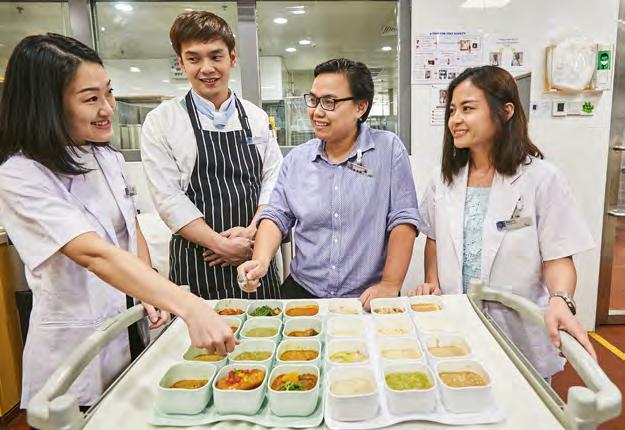

This means that patients who require more time to recover and rehabilitate can be assured that care plans made in their acute phase of treatment can be smoothly transitioned as their care needs evolve.
“We continue nutrition care plans and work with YCH patients on their diet progression along with recovery progression. We also support patients as they adjust to their improved health status, lifestyle and dietary habits,” says Chan Sue Mei, Deputy Head, N&D, Yishun Health. As patients in the intermediate care setting tend to stay a lot longer, there may be some challenges. “People are usually more compliant with their meal prescriptions while they are acutely sick but, once it extends beyond five days or so, diet restrictions may become an area of contention.” However, she sees it as an opportunity to educate and work with patients. “We use this to start conversations to educate patients on the benefits of their new diets and reinforce how they can be responsible and take charge of their own health through their food choices.”
The most important aspect of these engagements is to build rapport and encourage patients to think about actionable strategies that work for them in their own lives. “There is no point in being too restrictive,” Sue Mei advises. “We need to emphasise sustainable ways to achieve their health goals and help them focus on the options available rather than the limitations.” In fact, patients in YCH are given the opportunities to choose and enjoy food brought in from their caregivers, so the dietitians are able
Food nourishes and brings people together. Have fun exploring, preparing and sharing food with family and friends.
CHAN SUE MEI DEPUTY HEAD, N&D, YISHUN HEALTHSenior Dietitians Teoh Huiru and Magan Ho (left & right) work closely with Food Services to ensure patients are served with food that are aligned with their dietary needs Chow Pek Yee (left), Head, N&D, and Chan Sue Mei, Deputy Head, N&D, work closely to lead their team of dietitians in Yishun Health
to help them assess the quality of their meals. This helps the lessons become more practical. “After all,” Sue Mei points out, “people live their life more in the community than in the hospital, so we need to empower them to make better choices every day.”
According to Chong Sin Tzun, Senior Dietitian, N&D, KTPH, the work to sustain and support patients in managing chronic conditions forms the bulk of a dietitian’s work in the outpatient setting and beyond. “We follow up with patients and work closely with their healthcare teams to manage their disease holistically.”
Besides providing knowledge to help them be better informed, motivating them, and debunking myths, Sin Tzun also keeps an eye out for malnutrition. She highlights that some people — such as those
on peritoneal dialysis or those older than 65 — require more protein in their diet to prevent frailty and other nutrition-related issues. “Our goal is to continue to educate people and drive lifestyle changes,” she adds. To this end, Yishun Health’s dietitians partner numerous healthcare professionals and community partners to drive health literacy and public awareness across a range of issues around food and nutrition.
Working with the community as part of Population Health & Community Transformation’s Screening and Intervention Team is Karishma Surtani, Senior Dietitian, KTPH. She works to educate residents in making sustainable lifestyle changes. “Whatever is taught in the wards, clinics and counselling
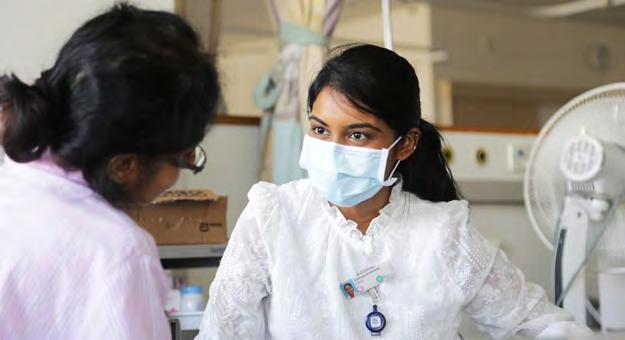
sessions, we work with residents to translate that into action,” she explains her role. This is done through a variety of outreach activities in Yishun Health’s Wellness Kampungs, and other community settings such as public forums.
What she does is ‘meet’ residents where they are, whether they are looking to eat more vegetables, learning to cook healthier dishes, or buying a week’s worth of groceries for meal preparation. “We figure out what the best strategy is to help them improve their health by first understanding their needs, interests and goals,” she shares. Thereafter, she works with them to impart practical skills and knowhow. “We aim to give control back to the residents in their lifestyle
As a health-promoting hospital, Yishun Health encourages people to make smarter food choices at its food outlets. Our dietitians work with the Yishun Health Tenancy Committee to ensure food outlets use health-promoting strategies, such as price differentiation and strategic display placements, to nudge healthy eating changes.

choices, and build relationships that create opportunities to nudge and influence lifestyle changes.”
Karishma also trains community nurses in foundational knowledge to reinforce healthy-eating messages and identify malnutrition risks during home visits and other interactions so they can continue to influence residents’ nutrition.
One of the most interesting aspects of a dietitian’s work is developing recipes. Dietitians like Magan work with Yishun Health’s Food Services team to assess the nutritional value of meals and ensure that they are modified to meet different requirements. This includes creating festive menus with the chefs that integrate healthier ingredients.
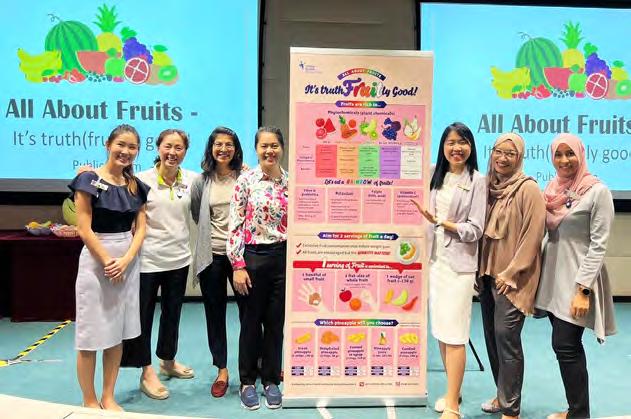
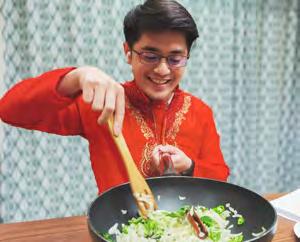
The most important aspect of healthy eating is knowing what goes into one’s food, and cooking one’s own meal is a great way to start. This is where Ryan Ong, Senior Dietitian, N&D, KTPH, comes in. He runs nutritional events as well as fortnightly healthy cooking demonstrations that showcase easy-to-follow recipes with only
eight ingredients or fewer. “We want to dispel the myth that healthy eating is boring or bland — or that it means avoiding treats altogether,” he says.
It is all about knowing the relationship between food and health, then applying them in a balanced way as part of a balanced lifestyle. Pek Yee points out, “Dietitians actually love food just like anyone else, and we want to show that we can enjoy eating and still achieve good health!”
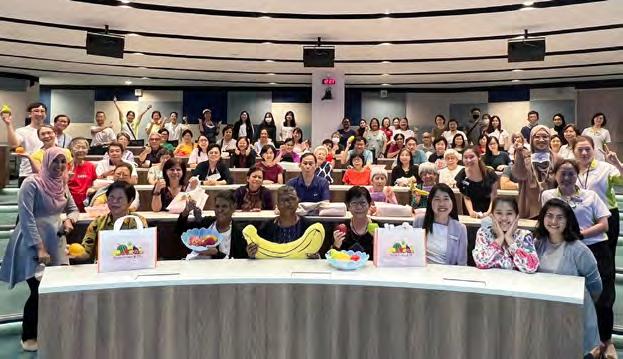
No food is bad food. Try to have a variety of choices and, most importantly, enjoy your meals with your loved ones!
CHOW PEK YEE HEAD, N&D, YISHUN HEALTHCooking demonstrations conducted regularly by Senior Dietitian Ryan Ong offer a step-by-step guide on how to prepare delicious and healthy dishes in an interactive manner Senior Dietitian Karishma Surtani (top photo, third from left) was part of the recent ‘All About Fruits: It’s Truth(fruit)ly Good!’ public forum that educated the community on the benefits and portion sizes of fruits
As these three colleagues in Khoo Teck Puat Hospital’s Major Operating Theatre (MOT) look back on their 50 years of working in healthcare, Jacquelyn Khng, Nurse Clinician; Johariah Binti Kasmawi, Principal Enrolled Nurse;
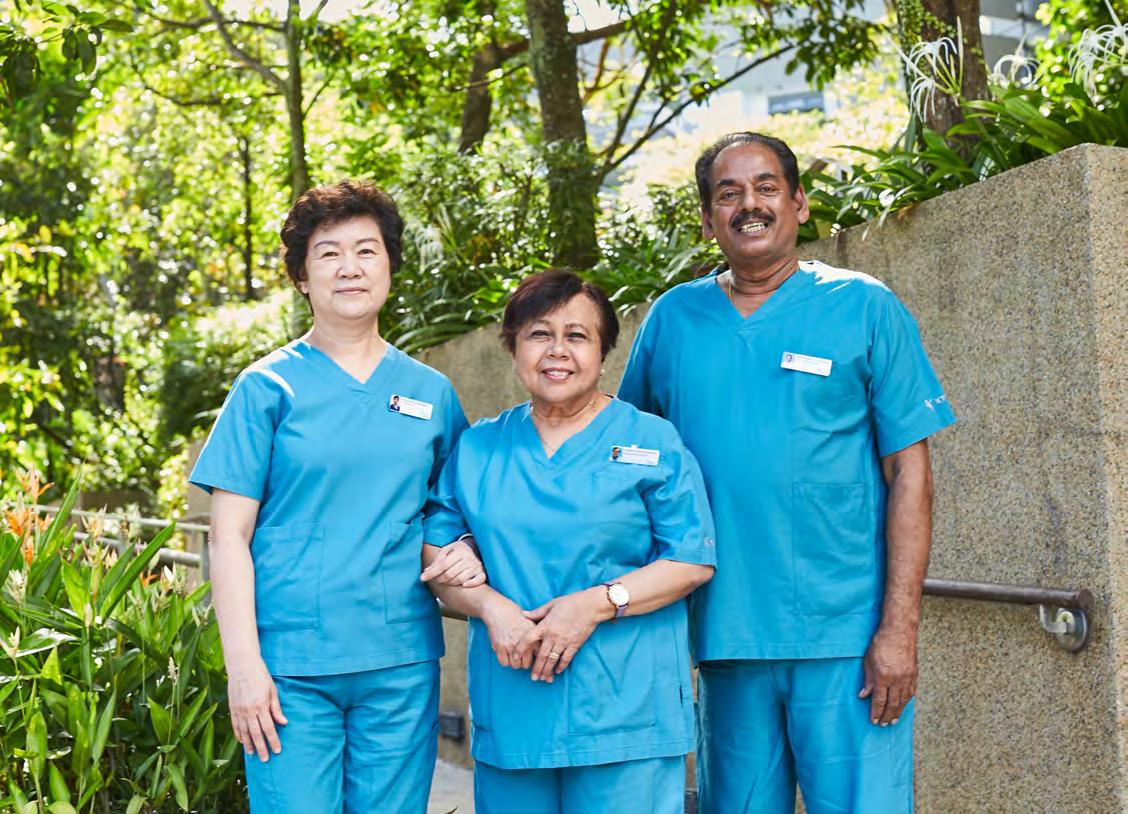
and Veerasingam S/O Neelakandan, Senior Healthcare Assistant, all reveal rather different ‘origin stories’ that led them to their lifelong careers.
While their points of entry into the field differ, their experiences over the years share some things in common — most significantly,
the profoundly rewarding sense of fulfilment when one extends compassion, care and comfort to patients and supports them on their road to better health.
For Johariah, she was working in a clerical role at an electronics company after she graduated from
Having each received the 50-year Long Service Award this year, these three veterans in the Major Operating Theatre share how a sense of belonging, resilience and compassion for others have kept them going strong in their careers.
secondary school, but her parents insisted she take up a government job for stability. “I wanted to be a teacher, but did not get in, so I followed my friend and applied to be a nurse instead,” she recalls. That decision would turn out to be one of the best she has ever made, landing her in a job that has challenged and developed her professional skillsets and personal strengths in the best ways.
Nursing also never really crossed Jacquelyn’s mind as a career; she wanted to join the army. But it was her grandfather’s recovery after a fall that led her to take up the caring profession. The elderly gentleman was unable to walk on his own, but doggedly pursued his own form of physical rehabilitation. Using two low stools, he manoeuvred himself around the house by shifting himself on them while seated. After many months of this, he built up his strength and finally managed to regain his ability to stand and walk. “He was so determined to get better. I thought about the people who do not have the support to
recover and I wanted to help them,” Jacquelyn shares.
Veerasingam’s journey was similarly inspired by a loved one. Already working as a Healthcare Assistant, he had many close interactions with healthcare workers even outside of his job, as his wife was unwell and had frequent medical appointments for her arthritis and diabetes. “I saw how well she was cared for by her doctors, nurses and other healthcare professionals. We felt very touched and supported, and I was motivated to continue my contributions in healthcare, too.”
Although not quite ‘love at first sight’, their devotion to their jobs blossomed over time. Honed and strengthened by many ups and downs, their passion for their healthcare roles has deepened over the years. From learning the ropes and adapting to the many changes in the field to becoming seniors and mentors themselves, they have grown in tandem with Yishun Health’s own evolution.
All three veterans fondly remember Yishun Health’s early days. The then Alexandra Hospital was small and a little run-down, especially by today’s standards; nevertheless, it had its charms. With its colonial architecture and green surrounds, there was a kampung spirit about the place. This, says Jacquelyn, was evident beyond the physical characteristics of the hospital. “It was a very cosy place, and we were all very close-knit, like family.”
In the early 2000s, as the hospital began its phase of major transformation and growth, she and Johariah decided to stay with the organisation through this challenging period of change. They believed in the hospital’s renewed mission to care for patients like one’s own loved ones and to deliver quality person-centred service and care. “We felt strongly about this hospital’s goals and what it was doing,” says Jacquelyn.
It was a period of hard work and much learning. However, this was all

Our number one priority is our patients, their safety and comfort. I treat each one like a friend, chat with them, give them a blanket if they need one, and calm them before they go in for their surgery.
In life we have to keep on learning; it is important to be humble and work as a team with your colleagues.
Veerasingam S/O Neelakandan Senior Healthcare Assistant, Major Operating Theatre, KTPH
Johariah Binti Kasmawi
Principal Enrolled Nurse, Major Operating Theatre, KTPH
part of the journey of improvement. “In life we have to keep on learning; it is important to be humble and work as a team with your colleagues,” Johariah adds.
And when the hospital moved to the north and became KTPH, they followed too. Even though the hospital ‘upgraded’ from its colonial buildings to a modern development of glass and steel, the kampung spirit has remained, thanks to the veterans and pioneers who carry on the legacy and culture of care. Veerasingam observes, “We have grown and learnt a lot — and the heart of the organisation remains.”
It is this sense of mission and belonging that keeps them going each day, working together at the MOT. It is a dynamic and often high-stakes environment, where they attend to emergencies, medical crises, and complex surgical procedures.
“Our number one priority is our
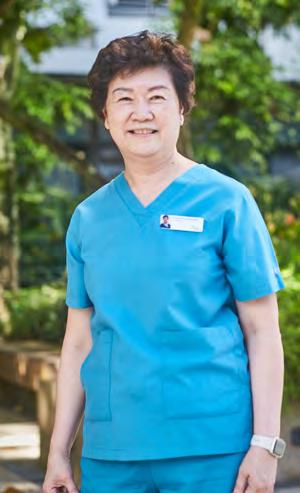
patients, their safety and comfort,” affirms Veerasingam. “I treat each one like a friend, chat with them, give them a blanket if they need one, and calm them before they go in for their surgery.” In his role as Senior Healthcare Assistant, Veerasingam prepares the operating room ahead of each patient, is on hand during the surgery, and cleans up afterwards — a process that takes four to five hours each time. It is gruelling work, but he takes pride in knowing his effort contributes to the team and benefits every patient.
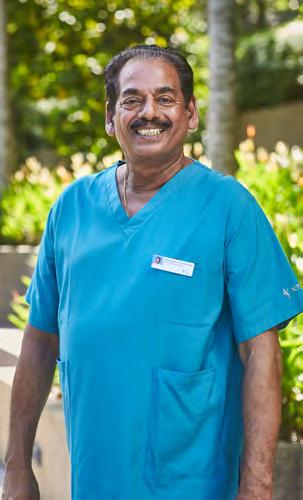
As for Jacquelyn and Johariah, their role sees them undertaking multiple tasks, from assisting doctors and monitoring patients before and during procedures to ensuring that patients are stable post-operation. “It can be a difficult job and very stressful, but when you see your patients get well, you feel a sense of achievement,” shares Jacquelyn. “Every time a patient is transferred safely out of the theatre, we are happy,” adds Johariah.
At the MOT, the team sees all kinds of different scenarios. And while there are many triumphs and successes, there are times when medical science and technology reaches its limits and patients cannot be saved. “We feel every loss strongly,” says Veerasingam. “But having the support of a team always helps us to uplift and encourage each other.”
Even as they give themselves space to process the sad times, the team always bounces back to focus on the good they have done and not giving up. This resilience has been an important factor for their longevity and unwavering dedication to the profession. “In the healthcare profession, we are able to render help to those who are suffering and care for people in need. Even in our most difficult moments, we keep on going, knowing that we can play a part in healing wounds, soothing the sick, and alleviating pain,” says Jacquelyn, revealing the secret that has kept them going for 50 years.
Even in our most difficult moments, we keep on going, knowing that we can play a part in healing wounds, soothing the sick, and alleviating pain.
In consultation with Dr Tan Seng Kiong, Consultant, Diabetes Centre, Admiralty Medical Centre & General Medicine (Diabetes), KTPH
Tcatching up with our friends and loved ones. However, the celebratory meals, sweet treats, and savoury snacks can pose a challenging environment for all of us — especially if you have diabetes — when it comes to eating healthily.
According to the Singapore Ministry of Health, about one in three Singaporeans has a lifetime risk of developing diabetes. For people living with diabetes and pre-diabetes, it is still possible to have a good meal while staying healthy. Together with your loved ones, we can B.E.A.T. diabetes.

What’s a holiday season without the joy of some indulgence? With a few strategic approaches, you can have your kueh and eat it too — if you do so in moderation, and apply some smart moves and clever choices.
It is important to be aware of your own medical condition and be familiar with your medications. Knowing your medical condition will help you to be more mindful of the food choices you make. Remember to take your medications regularly and at the appropriate times to keep your diabetes in check.
Eating is a social activity, and it is inevitable that we indulge a little during the festive season. We can make a conscious effort to eat in moderation and make healthier food choices during gatherings with our friends and loved ones. And if you do have a rare treat, remember to fully savour it and enjoy the experience! [Turn to the Q&A section on page 22 for more on this topic.]
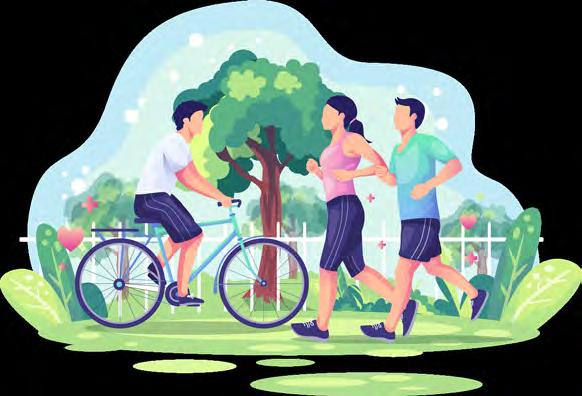
Being physically healthy works synergistically with a healthy diet to keep diabetes and pre-diabetes in check. Exercise makes our body more sensitive to insulin, which improves blood glucose levels. Exercise can help to improve diabetes control, keep pre-diabetes at bay, and improve our cardiovascular health and mental well-being. You can gather your friends and family to go on hikes before or after your feast to burn off the excess blood glucose and calories.
Do take your medications regularly, and keep to your follow-up appointments during the festive season. Work closely with your medical team to keep your conditions in check. If you are travelling during the festive period, discuss with your care team whether any specific precautions are required to have a safe and enjoyable trip.

Recipe provided by Moy Cheng Han, Demi Chef de Partie, Food Services, in consultation with Nutrition & Dietetics, KTPH
Serves 10
• 20g used coffee grounds
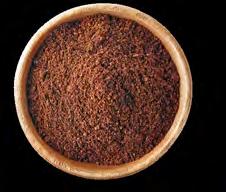
• 38g margarine
• 38g butter
• 40g brown sugar
• 2 egg yolks
• 136g plain flour
• 10g baking powder
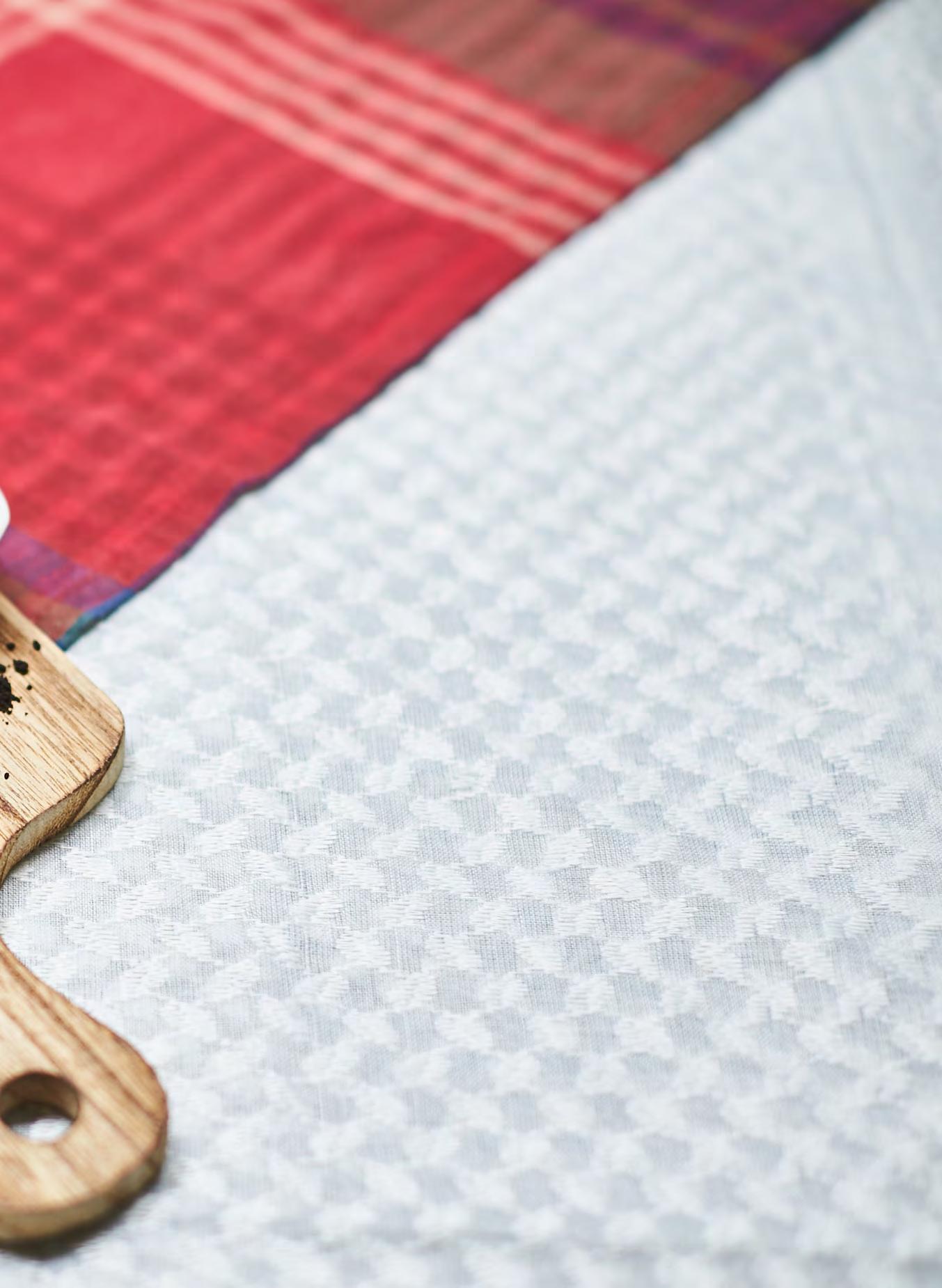
• 1g salt
1. Pre-heat oven to 100oC
2. Pat the used coffee grounds to remove excess moisture, bake for 15 minutes till dry, then set aside 3. Pre-heat oven to 170oC 4. In a mixing bowl, beat together the margarine, butter and brown sugar till fluffy
Add in egg yolks one at a time, mixing well with each addition
Into the creamed mixture, fold in plain flour, baking powder, salt, and coffee grounds
Rest the dough in the fridge for 15 minutes 8. Divide the dough into balls of about 6g each, to yield about 50 cookies
Bake at 170oC for about 15 minutes or until baked through
Over the last few years, Singapore powerlifters have stolen the spotlight in both regional and world stages. This has boosted local strength sports not just for those who are looking to compete but also for everyday folk wishing to build functional health and physical fitness.
Strength training is a highly structured programme where the muscles are gradually exposed to low-repetition, high-intensity, nonrandom, incremental movements. It is thus different from exercises such as running, swimming and cycling, team sports, racquet sports or most circuit training classes.
The exercises are planned to put the muscles under a reasonably high strain such that no more than 20 repetitions can be performed at a go without rest. Over time, as your muscles get stronger, you will be able to progressively lift heavier loads.
Strength training increases the body’s ability to generate muscular force. As your muscles, tendons and joints progressively adapt to handle these forces, other physical functions also improve.
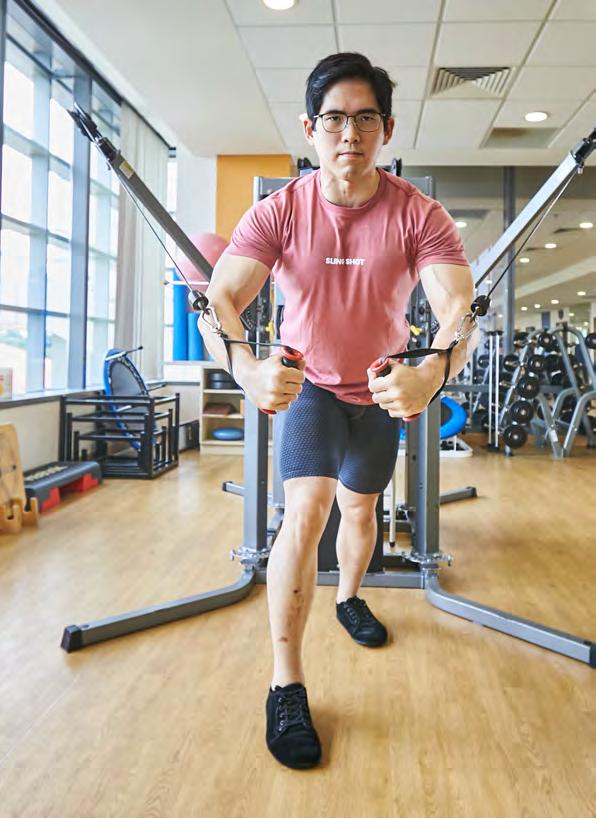
Getting stronger means your functional health improves. You will be able to walk faster, carry heavy groceries, and even do housework more easily. Increased muscular strength also reduces the risk of falls and injury in all other areas of life. In addition, it helps maintain a healthy body composition, keeps bones strong, boosts mental health, and improves cognitive function in older adults.
Like any exercise, there are also risks. Overexertion and a poor training plan can result in musculoskeletal injury. However, it is worth noting that strength sports
report a low rate of injury, between one and four injuries per 1,000 hours of training (this is approximately two to four years), with a majority of injuries lasting two weeks or shorter. Contrast this with running or football, which reports higher incidences of injury. This reinforces the importance of a properly structured strength training programme for a safe and injury-free outcome.
For many of us who keep an active lifestyle, strength training is often overlooked. The Singapore Physical Activity Guidelines (SPAG) 2022 recommends at least two days of moderate to vigorous intensity muscle-strengthening exercises a week, training all major muscle groups through a full range of motion. Unfortunately, only a third of the population met this guideline in 2020.
Strength sports are gaining popularity among athletes and those looking to build physical strength to power through everyday life. Here is how you can implement a simple progressive strength training routine into your regular exercise plan.
In consultation with Dr Benjamin Soh, Registrar, Sports and Exercise Medicine, KTPH
One way to better integrate strength training into your exercise plan is to perform compound movements, which require the use of more than one joint.
Novices can actually start at home with body weight exercises or filled water bottles. Once you get fitter, free weights —
such as resistance bands and dumbbells — provide the greatest combination of functional strength and scalability. This requires some familiarity with the exercises, so enlist the help of online resources or an in-person trainer.
To ensure your muscles become stronger, these exercises should
challenge the body while giving it time to rest. As a general rule, aim for three sets of eight to 12 challenging reps with a two- to five-minute break between. It is ideal to perform strength training exercises twice a week and use progressions/regressions as needed.
Repetitions, or reps, are the number of times you do a certain exercise (e.g. squats, push-ups, sit-ups, lunges). Sets refer to the number of times you do a specific amount of reps.
Exercise:
Push-ups (as pictured)
Regression less intense:
• Hand-elevated push-ups
• Knee push-ups
• Wall push-ups
Progression more intense: Feet-elevated push ups
Free weight alternatives:
• Dumbbell or barbell bench press
• Incline Press
• Dumbbell or barbell shoulder press
• Machine chest or shoulder press
Exercise: Incline pull-ups


Regression less intense: Assisted or bent-knee incline pull-ups
Progression more intense: Pull-ups (as pictured)
Free weight alternatives:
• Lat pulldown
• Dumbbell or barbell row
• Cable row
Exercise:
Single-leg glute bridge (as pictured)
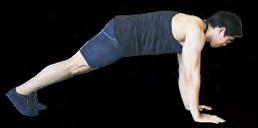
Regression less intense:
• Glute bridge
• Prone back extension


Progression more intense:
• Single-leg hip thrust
• Long Lever bridge
Free weight alternatives: Dumbbell, barbell or trap bar deadlift
Exercise:
Side or front plank (side plank pictured)
Regression less intense:
Side or front plank on knees

Progression more intense:
• Plank with rotation
• Side plank with leg lift
Free weight alternatives:
• Weighted plank
• Wood chopper
• Pallof press
Exercise: Lunge (as pictured)


Regression less intense:
• Bodyweight squat
• Sit to stand
Progression more intense:
• Single-leg squat
• Pistol squat
Free weight alternatives:
• Barbell squat
• Goblet or zercher squat
• Leg press
Exercise:
Single-leg calf raise (as pictured)
Regression less intense:
• Two-leg bodyweight calf raise

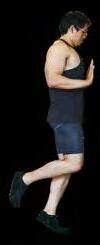

• Seated two-leg calf raise
Progression more intense: Single-leg calf raise on edge of step
Free weight alternatives:
• Weighted calf raise
• Calf press
Community
Wellness Kampung is an initiative comprising three wellness and care centres for residents in the North. They provide a suite of health and social programmes, creating a support network for residents to inspire each other to adopt healthier lifestyles in a close-knit 'kampung' setting.
Opening hours: Mondays to Fridays, 8.30am to 5.30pm (closed on Saturdays, Sundays and all Public Holidays)*
115 Chong Pang
Blk 115 Yishun Ring Road #01-495, Singapore 760115
6257 4702
260 Nee Soon East
Blk 260 Yishun Street 22 #01-87, Singapore 760260 6257 4802

765 Nee Soon Central
Blk 765 Yishun Street 72 #01-366, Singapore 760765 6257 4842
*In light of COVID-19 safe management measures, please check the KTPH website for the centre schedule and call in advance to see if there are vacancies for group activities.
AdMC is a one-stop medical centre for specialist outpatient consultation, day surgery, rehabilitation and diagnostic services, as well as community health outreach activities.
676 Woodlands Drive 71, #03-01 Kampung Admiralty, Singapore 730676
6807 8000 www.admiraltymedicalcentre.com.sg www.fb.com/admiraltymedicalcentre
KTPH is a 795-bed general and acute care hospital serving more than 550,000 people living in the north of Singapore. It combines medical expertise with high standards of personalised care in a healing environment, to provide care good enough for our own loved ones.
90 Yishun Central Singapore 768828 6555 8000 www.ktph.com.sg www.fb.com/khooteckpuathospital
YCH provides intermediate care for recuperating patients who do not require the intensive services of an acute care hospital. Situated beside KTPH, the two hospitals provide an integrated care experience for patients.
2 Yishun Central 2 Singapore 768024
6807 8800 www.yishuncommunityhospital.com.sg www.fb.com/yishuncommunityhospital